The Differences in a Research Report and Research Paper
Derek m. kwait.

When writing a paper, maybe the only thing more daunting than actually writing it is deciding what you're even supposed to be writing about. Research reports, research papers...it gets confusing. They are actually not the same thing, and knowing the difference between them will save you time and frustration, help you stay on-target and ultimately help you get the highest possible grade.

Explore this article
- Defining Research
- What is a Research Report?
- What is a Research Paper?
- A Word of Caution
1 Defining Research
According to Webster's Dictionary, research can be a "careful or diligent search," a "studious inquiry or examination... aimed at the discovery and interpretation of facts...in the light of new facts, or practical application of such new or revised theories or laws" or "the collecting of information about a particular subject."
While research reports and research papers both involve much of the first definition, a research report is more concerned with the second, and a research paper with the third.
2 What is a Research Report?
A research report is a paper reporting research that has already been conducted. As such, it is used primarily in the sciences to tell other scientists (or your instructor) about the process, findings and significance of your experiment.
According to a guide prepared by the American Chemical Society, a good research report of any kind should be organized in a way that parallels the method of scientific reasoning. The usual parts of this report are Title, Abstract, Introduction, Experimental Details or Theoretical Analysis, Results, Discussion, Conclusions and Summary, then References.
3 What is a Research Paper?
A research paper, on the other hand, is the research itself. In other words, a research paper typically presents quotes or information from books or scholarly papers or even movies, then analyzes them to reach some sort of conclusion. It does not report on an objective, reproducible experiment done elsewhere but instead focuses on establishing the author's thesis and arguing in favor of it. Research papers are usually used in the humanities. The format for a good research paper includes an introductory paragraph, two or three body paragraphs and a conclusion.
4 A Word of Caution
This explanation covers how these terms are typically used; there is no universally agreed upon definition of either term. Sometimes an instructor will assign a research report when he really meant a research paper or vice versa. You can usually tell what is required by what kind of class it is and what the instructor says he wants (for example, if a laboratory experiment is involved, chances are a research report is required) but if you are really unsure, ask.
- 1 ACS: Preparing a Research Report
- 2 Purdue Online Writing Lab: Research
About the Author
Derek M. Kwait has a Bachelor of Arts in English writing from the University of Pittsburgh and has been writing for most of his life in various capacities. He has worked as a staff writer and videographer for the "Jewish Chronicle of Pittsburgh" and also has training writing fiction, nonfiction, stage-plays and screenplays.
Related Articles

The Difference Between Research & Science

How to Write an Introduction of a Report

Reasons for a Hypothesis

The Advantages of a Formal Report

The Advantages of Exploratory Research Design

The Advantages of Writing an Inductive Essay

Steps in Writing a Report

How to Properly Write Book Titles in a Report

What Is a Problem Statement in a Lab Report?

How to Start a Thesis Statement

The Five Approaches to Qualitative Research

How to Write Up a Science Experiment in 3rd Grade

How to Write a Documented Essay

Six-Step Scientific Method for Elementary Kids

How to Find Empirical Articles

What is the Difference Between Criminal Justice & Criminology?

The Difference Between Analysis & Findings in a Research...

How to Critique a Dissertation

What Are the Advantages & Disadvantages of Correlation...

Difference Between Conceptual & Theoretical Framework
Regardless of how old we are, we never stop learning. Classroom is the educational resource for people of all ages. Whether you’re studying times tables or applying to college, Classroom has the answers.
- Accessibility
- Terms of Use
- Privacy Policy
- Copyright Policy
- Manage Preferences
© 2020 Leaf Group Ltd. / Leaf Group Media, All Rights Reserved. Based on the Word Net lexical database for the English Language. See disclaimer .

- LaChance Library
Q. What's the difference between a report and a research paper?
- 2 Academic Support
- 2 Annotated Bibliography
- 2 Borrowing
- 9 Citations
- 33 Databases
- 1 Evaluating Information
- 7 Films/Movies
- 26 Finding Information
- 2 Library Cards
- 3 Login from Home
- 21 Research Papers
- 3 Research Skills MOOC
- 8 Research Topic
- 1 Study Rooms
- 3 Textbooks
- 3 Thesis Statements
Answered By: Brooke Gilmore Last Updated: Jan 12, 2022 Views: 63016

But wait, there's more. Check out Research Starter Toolkit , a step-by-step guide to help you succeed.
- Share on Facebook
Was this helpful? Yes 230 No 22
Comments (3)
- This is a wonderful website with step-by-step information on how to write a research paper. My college English students found it very helpful, and they are actually using it! by Lori Fox on Nov 22, 2017
- This site is amazing, it helped to receive a 98 on a research paper would recommend it if you are anywhere confused about writing a research paper by Sergio Cristian Ruiz on Jul 18, 2018
- very good by zewran ihsas on Mar 18, 2021
Related Topics
- Research Papers
Ask a Librarian
- Privacy Policy

Home » Research Report – Example, Writing Guide and Types
Research Report – Example, Writing Guide and Types
Table of Contents

Research Report
Definition:
Research Report is a written document that presents the results of a research project or study, including the research question, methodology, results, and conclusions, in a clear and objective manner.
The purpose of a research report is to communicate the findings of the research to the intended audience, which could be other researchers, stakeholders, or the general public.
Components of Research Report
Components of Research Report are as follows:
Introduction
The introduction sets the stage for the research report and provides a brief overview of the research question or problem being investigated. It should include a clear statement of the purpose of the study and its significance or relevance to the field of research. It may also provide background information or a literature review to help contextualize the research.
Literature Review
The literature review provides a critical analysis and synthesis of the existing research and scholarship relevant to the research question or problem. It should identify the gaps, inconsistencies, and contradictions in the literature and show how the current study addresses these issues. The literature review also establishes the theoretical framework or conceptual model that guides the research.
Methodology
The methodology section describes the research design, methods, and procedures used to collect and analyze data. It should include information on the sample or participants, data collection instruments, data collection procedures, and data analysis techniques. The methodology should be clear and detailed enough to allow other researchers to replicate the study.
The results section presents the findings of the study in a clear and objective manner. It should provide a detailed description of the data and statistics used to answer the research question or test the hypothesis. Tables, graphs, and figures may be included to help visualize the data and illustrate the key findings.
The discussion section interprets the results of the study and explains their significance or relevance to the research question or problem. It should also compare the current findings with those of previous studies and identify the implications for future research or practice. The discussion should be based on the results presented in the previous section and should avoid speculation or unfounded conclusions.
The conclusion summarizes the key findings of the study and restates the main argument or thesis presented in the introduction. It should also provide a brief overview of the contributions of the study to the field of research and the implications for practice or policy.
The references section lists all the sources cited in the research report, following a specific citation style, such as APA or MLA.
The appendices section includes any additional material, such as data tables, figures, or instruments used in the study, that could not be included in the main text due to space limitations.
Types of Research Report
Types of Research Report are as follows:
Thesis is a type of research report. A thesis is a long-form research document that presents the findings and conclusions of an original research study conducted by a student as part of a graduate or postgraduate program. It is typically written by a student pursuing a higher degree, such as a Master’s or Doctoral degree, although it can also be written by researchers or scholars in other fields.
Research Paper
Research paper is a type of research report. A research paper is a document that presents the results of a research study or investigation. Research papers can be written in a variety of fields, including science, social science, humanities, and business. They typically follow a standard format that includes an introduction, literature review, methodology, results, discussion, and conclusion sections.
Technical Report
A technical report is a detailed report that provides information about a specific technical or scientific problem or project. Technical reports are often used in engineering, science, and other technical fields to document research and development work.
Progress Report
A progress report provides an update on the progress of a research project or program over a specific period of time. Progress reports are typically used to communicate the status of a project to stakeholders, funders, or project managers.
Feasibility Report
A feasibility report assesses the feasibility of a proposed project or plan, providing an analysis of the potential risks, benefits, and costs associated with the project. Feasibility reports are often used in business, engineering, and other fields to determine the viability of a project before it is undertaken.
Field Report
A field report documents observations and findings from fieldwork, which is research conducted in the natural environment or setting. Field reports are often used in anthropology, ecology, and other social and natural sciences.
Experimental Report
An experimental report documents the results of a scientific experiment, including the hypothesis, methods, results, and conclusions. Experimental reports are often used in biology, chemistry, and other sciences to communicate the results of laboratory experiments.
Case Study Report
A case study report provides an in-depth analysis of a specific case or situation, often used in psychology, social work, and other fields to document and understand complex cases or phenomena.
Literature Review Report
A literature review report synthesizes and summarizes existing research on a specific topic, providing an overview of the current state of knowledge on the subject. Literature review reports are often used in social sciences, education, and other fields to identify gaps in the literature and guide future research.
Research Report Example
Following is a Research Report Example sample for Students:
Title: The Impact of Social Media on Academic Performance among High School Students
This study aims to investigate the relationship between social media use and academic performance among high school students. The study utilized a quantitative research design, which involved a survey questionnaire administered to a sample of 200 high school students. The findings indicate that there is a negative correlation between social media use and academic performance, suggesting that excessive social media use can lead to poor academic performance among high school students. The results of this study have important implications for educators, parents, and policymakers, as they highlight the need for strategies that can help students balance their social media use and academic responsibilities.
Introduction:
Social media has become an integral part of the lives of high school students. With the widespread use of social media platforms such as Facebook, Twitter, Instagram, and Snapchat, students can connect with friends, share photos and videos, and engage in discussions on a range of topics. While social media offers many benefits, concerns have been raised about its impact on academic performance. Many studies have found a negative correlation between social media use and academic performance among high school students (Kirschner & Karpinski, 2010; Paul, Baker, & Cochran, 2012).
Given the growing importance of social media in the lives of high school students, it is important to investigate its impact on academic performance. This study aims to address this gap by examining the relationship between social media use and academic performance among high school students.
Methodology:
The study utilized a quantitative research design, which involved a survey questionnaire administered to a sample of 200 high school students. The questionnaire was developed based on previous studies and was designed to measure the frequency and duration of social media use, as well as academic performance.
The participants were selected using a convenience sampling technique, and the survey questionnaire was distributed in the classroom during regular school hours. The data collected were analyzed using descriptive statistics and correlation analysis.
The findings indicate that the majority of high school students use social media platforms on a daily basis, with Facebook being the most popular platform. The results also show a negative correlation between social media use and academic performance, suggesting that excessive social media use can lead to poor academic performance among high school students.
Discussion:
The results of this study have important implications for educators, parents, and policymakers. The negative correlation between social media use and academic performance suggests that strategies should be put in place to help students balance their social media use and academic responsibilities. For example, educators could incorporate social media into their teaching strategies to engage students and enhance learning. Parents could limit their children’s social media use and encourage them to prioritize their academic responsibilities. Policymakers could develop guidelines and policies to regulate social media use among high school students.
Conclusion:
In conclusion, this study provides evidence of the negative impact of social media on academic performance among high school students. The findings highlight the need for strategies that can help students balance their social media use and academic responsibilities. Further research is needed to explore the specific mechanisms by which social media use affects academic performance and to develop effective strategies for addressing this issue.
Limitations:
One limitation of this study is the use of convenience sampling, which limits the generalizability of the findings to other populations. Future studies should use random sampling techniques to increase the representativeness of the sample. Another limitation is the use of self-reported measures, which may be subject to social desirability bias. Future studies could use objective measures of social media use and academic performance, such as tracking software and school records.
Implications:
The findings of this study have important implications for educators, parents, and policymakers. Educators could incorporate social media into their teaching strategies to engage students and enhance learning. For example, teachers could use social media platforms to share relevant educational resources and facilitate online discussions. Parents could limit their children’s social media use and encourage them to prioritize their academic responsibilities. They could also engage in open communication with their children to understand their social media use and its impact on their academic performance. Policymakers could develop guidelines and policies to regulate social media use among high school students. For example, schools could implement social media policies that restrict access during class time and encourage responsible use.
References:
- Kirschner, P. A., & Karpinski, A. C. (2010). Facebook® and academic performance. Computers in Human Behavior, 26(6), 1237-1245.
- Paul, J. A., Baker, H. M., & Cochran, J. D. (2012). Effect of online social networking on student academic performance. Journal of the Research Center for Educational Technology, 8(1), 1-19.
- Pantic, I. (2014). Online social networking and mental health. Cyberpsychology, Behavior, and Social Networking, 17(10), 652-657.
- Rosen, L. D., Carrier, L. M., & Cheever, N. A. (2013). Facebook and texting made me do it: Media-induced task-switching while studying. Computers in Human Behavior, 29(3), 948-958.
Note*: Above mention, Example is just a sample for the students’ guide. Do not directly copy and paste as your College or University assignment. Kindly do some research and Write your own.
Applications of Research Report
Research reports have many applications, including:
- Communicating research findings: The primary application of a research report is to communicate the results of a study to other researchers, stakeholders, or the general public. The report serves as a way to share new knowledge, insights, and discoveries with others in the field.
- Informing policy and practice : Research reports can inform policy and practice by providing evidence-based recommendations for decision-makers. For example, a research report on the effectiveness of a new drug could inform regulatory agencies in their decision-making process.
- Supporting further research: Research reports can provide a foundation for further research in a particular area. Other researchers may use the findings and methodology of a report to develop new research questions or to build on existing research.
- Evaluating programs and interventions : Research reports can be used to evaluate the effectiveness of programs and interventions in achieving their intended outcomes. For example, a research report on a new educational program could provide evidence of its impact on student performance.
- Demonstrating impact : Research reports can be used to demonstrate the impact of research funding or to evaluate the success of research projects. By presenting the findings and outcomes of a study, research reports can show the value of research to funders and stakeholders.
- Enhancing professional development : Research reports can be used to enhance professional development by providing a source of information and learning for researchers and practitioners in a particular field. For example, a research report on a new teaching methodology could provide insights and ideas for educators to incorporate into their own practice.
How to write Research Report
Here are some steps you can follow to write a research report:
- Identify the research question: The first step in writing a research report is to identify your research question. This will help you focus your research and organize your findings.
- Conduct research : Once you have identified your research question, you will need to conduct research to gather relevant data and information. This can involve conducting experiments, reviewing literature, or analyzing data.
- Organize your findings: Once you have gathered all of your data, you will need to organize your findings in a way that is clear and understandable. This can involve creating tables, graphs, or charts to illustrate your results.
- Write the report: Once you have organized your findings, you can begin writing the report. Start with an introduction that provides background information and explains the purpose of your research. Next, provide a detailed description of your research methods and findings. Finally, summarize your results and draw conclusions based on your findings.
- Proofread and edit: After you have written your report, be sure to proofread and edit it carefully. Check for grammar and spelling errors, and make sure that your report is well-organized and easy to read.
- Include a reference list: Be sure to include a list of references that you used in your research. This will give credit to your sources and allow readers to further explore the topic if they choose.
- Format your report: Finally, format your report according to the guidelines provided by your instructor or organization. This may include formatting requirements for headings, margins, fonts, and spacing.
Purpose of Research Report
The purpose of a research report is to communicate the results of a research study to a specific audience, such as peers in the same field, stakeholders, or the general public. The report provides a detailed description of the research methods, findings, and conclusions.
Some common purposes of a research report include:
- Sharing knowledge: A research report allows researchers to share their findings and knowledge with others in their field. This helps to advance the field and improve the understanding of a particular topic.
- Identifying trends: A research report can identify trends and patterns in data, which can help guide future research and inform decision-making.
- Addressing problems: A research report can provide insights into problems or issues and suggest solutions or recommendations for addressing them.
- Evaluating programs or interventions : A research report can evaluate the effectiveness of programs or interventions, which can inform decision-making about whether to continue, modify, or discontinue them.
- Meeting regulatory requirements: In some fields, research reports are required to meet regulatory requirements, such as in the case of drug trials or environmental impact studies.
When to Write Research Report
A research report should be written after completing the research study. This includes collecting data, analyzing the results, and drawing conclusions based on the findings. Once the research is complete, the report should be written in a timely manner while the information is still fresh in the researcher’s mind.
In academic settings, research reports are often required as part of coursework or as part of a thesis or dissertation. In this case, the report should be written according to the guidelines provided by the instructor or institution.
In other settings, such as in industry or government, research reports may be required to inform decision-making or to comply with regulatory requirements. In these cases, the report should be written as soon as possible after the research is completed in order to inform decision-making in a timely manner.
Overall, the timing of when to write a research report depends on the purpose of the research, the expectations of the audience, and any regulatory requirements that need to be met. However, it is important to complete the report in a timely manner while the information is still fresh in the researcher’s mind.
Characteristics of Research Report
There are several characteristics of a research report that distinguish it from other types of writing. These characteristics include:
- Objective: A research report should be written in an objective and unbiased manner. It should present the facts and findings of the research study without any personal opinions or biases.
- Systematic: A research report should be written in a systematic manner. It should follow a clear and logical structure, and the information should be presented in a way that is easy to understand and follow.
- Detailed: A research report should be detailed and comprehensive. It should provide a thorough description of the research methods, results, and conclusions.
- Accurate : A research report should be accurate and based on sound research methods. The findings and conclusions should be supported by data and evidence.
- Organized: A research report should be well-organized. It should include headings and subheadings to help the reader navigate the report and understand the main points.
- Clear and concise: A research report should be written in clear and concise language. The information should be presented in a way that is easy to understand, and unnecessary jargon should be avoided.
- Citations and references: A research report should include citations and references to support the findings and conclusions. This helps to give credit to other researchers and to provide readers with the opportunity to further explore the topic.
Advantages of Research Report
Research reports have several advantages, including:
- Communicating research findings: Research reports allow researchers to communicate their findings to a wider audience, including other researchers, stakeholders, and the general public. This helps to disseminate knowledge and advance the understanding of a particular topic.
- Providing evidence for decision-making : Research reports can provide evidence to inform decision-making, such as in the case of policy-making, program planning, or product development. The findings and conclusions can help guide decisions and improve outcomes.
- Supporting further research: Research reports can provide a foundation for further research on a particular topic. Other researchers can build on the findings and conclusions of the report, which can lead to further discoveries and advancements in the field.
- Demonstrating expertise: Research reports can demonstrate the expertise of the researchers and their ability to conduct rigorous and high-quality research. This can be important for securing funding, promotions, and other professional opportunities.
- Meeting regulatory requirements: In some fields, research reports are required to meet regulatory requirements, such as in the case of drug trials or environmental impact studies. Producing a high-quality research report can help ensure compliance with these requirements.
Limitations of Research Report
Despite their advantages, research reports also have some limitations, including:
- Time-consuming: Conducting research and writing a report can be a time-consuming process, particularly for large-scale studies. This can limit the frequency and speed of producing research reports.
- Expensive: Conducting research and producing a report can be expensive, particularly for studies that require specialized equipment, personnel, or data. This can limit the scope and feasibility of some research studies.
- Limited generalizability: Research studies often focus on a specific population or context, which can limit the generalizability of the findings to other populations or contexts.
- Potential bias : Researchers may have biases or conflicts of interest that can influence the findings and conclusions of the research study. Additionally, participants may also have biases or may not be representative of the larger population, which can limit the validity and reliability of the findings.
- Accessibility: Research reports may be written in technical or academic language, which can limit their accessibility to a wider audience. Additionally, some research may be behind paywalls or require specialized access, which can limit the ability of others to read and use the findings.
About the author
Muhammad Hassan
Researcher, Academic Writer, Web developer
You may also like

Research Topics – Ideas and Examples

Research Project – Definition, Writing Guide and...

What is a Hypothesis – Types, Examples and...

Purpose of Research – Objectives and Applications

Research Questions – Types, Examples and Writing...

Implications in Research – Types, Examples and...
- Privacy Policy
Difference Between Research Paper and Research Report

Research Paper Definition
The research paper is, in fact, the complete & careful exploration of some specific topic or issue and reaching the results by interpreting the facts. In the research paper , the author writes about all the realistic implications of the research and its uses in the real scenario.
Research Report Definition
The research report is, in fact, a totally different piece of document that encloses the information regarding your research that what kind of investigation has been conducted in your research paper and for what purpose & in which circumstances you have conducted that research.
Research Paper and Research Report Comparison

Major Differences Between the Research Paper and Research Report
- By reading the definition only, it is easily recognized able fact that research paper represents the whole research process; on the other hand research report actually represents the concise overview and description about the complete research paper .
- Besides the definition of both, the main difference between a research paper and research report can be easily recognized only by having an overview of its complete format . Research paper encloses more chapters than the research report as a complete document. A fine research paper starts with a general introduction of the topic, and then includes a literature review of the other researchers regarding the same topic, a methodology that how you are going to do that research, results, and interpretation of the figures presented in the results. Most effective and thorough researches also narrate the importance of the research, implications and also the shortfalls of your research as well. Contrary to it, the research report cannot explain too much data about the research. Its main purpose is to enclose the course of action, results, and significance of the specific research papers which is to be discussed.
- From the above point discussed, it becomes obvious that research paper is a lengthy document because it encloses more chapters than that of the research report. Contrary to it the research report is the summarised overview of the important points of a specific research paper.
- Research paper in its literature section reviews the ideas and analysis of other researchers who already have done work on the same topic but may be in the different scenario. On the other hand, research report cannot discuss the research or investigations of other researchers but it only explains the procedure, conclusion, and importance of a specific research paper.
- The research paper can present the citations and quotations from other author’s papers along with their references or it can also narrate the ideas presented in books or movies about that topic or research in order to support your own research. However, the research report cannot narrate any kind of supportive material but only about the specifications and findings of your research work.
- Research paper and research report both are different from each other because the main purpose of both documents varies from each other. The main purpose of the research paper is to convince the readers that variables discussed in the specific research have some sort of relationship with each other and to persuade effectively writer have to quote previous researches with the same kind of experimentation or research done. On the other hand, the purpose of the research report is to provide information only. The research report provides the summarise information about the research being done; it can never be used to convince about any argument.
- Another distinction between both of them is that research paper will be based on a question or a query. Main focus of the author of the research paper will be to address the query which is stated as question or ambiguity in the start of the research paper. All efforts of the author will be inclined to provide the logic to the given or anticipated relation between two or more variables. On the other hand, the research report can never address any question or query. It is developed just to recap the important details of the targeted research paper.
- Moreover, the research report is focused to scrutinize and infer from given information. It involves arguments & logics along with gathering data. In contrast to it, the research report doesn’t need to involve any argument, analysis or interpretation of the results.
- Last but not the least research paper is a document that will be helpful in bringing distinctive and unique knowledge at the end of the research. Because research done in it is necessary to be conducted in different scenario or experimentation with a new combination of variables but research report is never inclined to do the same, It can never bring any new idea or knowledge in any case.
Also Study: 800+ Research Paper Examples
Characteristics of a Good Research Paper and Research Report
It has become very clear from all the above discussion that research paper and research report, both are a very different document from each other. But another fact is that there are some qualities and characteristics that may be common in both and all these qualities must be there in both documents to make them meaningful and worthy for reading.
- All the information given in the script should be based on facts only. No information should be imaginary or doubtful in any manner. Moreover, the information provided quotations or any research done by other researchers being quoted in the research paper should be provided with proofs and proper references.
- Language used for writing both types of documents must be clear and easy to understand. Use of jargons is strictly prohibited. Moreover, technical words must be used if necessary because more use of technical words will make it difficult for the reader to maintain attention in reading the whole paper. Easy and clear wording will make it more reader-friendly and understandable.
- It is also very necessary that document developed must be free of errors and there must be no duplication of any information in a single document. Duplication of information will directly lead to the decline in the interest of the reader & he will stop reading that document. Moreover, errors and doubtful information will decline the worth of the paper as well as the writer.
- The format of the research should be well prepared and its structure must be according to requirements. Otherwise, the document will lose its authenticity in the real sense.
- The manuscript developed, whether the research paper or research report must be oriented towards the result. Procedure, survey, and methodology every step should be inclined towards factual and clear results. If the results are ambiguous until the end, the whole effort of writing the document will be devastated. Moreover, each and every line is written should maintain an ethical reporting style in itself.
These qualities must be there in both documents in order to maintain the quality of the work and enhance the understanding of the manuscript for the readers. Any document, whether Research paper or research report must have these qualities, to attract the attention of the reader and make them read & understand the complete manuscript till the end.
Importance of understanding the differences between the research paper and Research Report
It is really necessary to understand the differences between the research paper and research report both. Because commonly these terms may be confused if asked generally but both types of documents have very different formats and designed to serve very different purposes. As research paper is a complete document in which each and every step of exploring a specific issue is documented along with guidance & support from the previous researches which are properly cited and referenced. On the other hand, the research report doesn’t have any concern with other researches, but it is restricted to give a concise summary of a specific research only. No other previous research is being discussed in the research report. So understanding and learning about the differences and characteristics of a good research paper and a research report will really contribute to add in the worth of the research.
Related Posts
Research paper example, how to write a motivational statement, how to write a good psychology research proposal, how to write a mechanical engineering research paper, apa research paper parts and sections, how to research a topic, how to write a personal essay, research project outline example, research paper format, what is a dissertation paper, leave a comment cancel reply.
Please enter an answer in digits: two × one =
Research report guide: Definition, types, and tips
Last updated
5 March 2024
Reviewed by
Short on time? Get an AI generated summary of this article instead
From successful product launches or software releases to planning major business decisions, research reports serve many vital functions. They can summarize evidence and deliver insights and recommendations to save companies time and resources. They can reveal the most value-adding actions a company should take.
However, poorly constructed reports can have the opposite effect! Taking the time to learn established research-reporting rules and approaches will equip you with in-demand skills. You’ll be able to capture and communicate information applicable to numerous situations and industries, adding another string to your resume bow.
- What are research reports?
A research report is a collection of contextual data, gathered through organized research, that provides new insights into a particular challenge (which, for this article, is business-related). Research reports are a time-tested method for distilling large amounts of data into a narrow band of focus.
Their effectiveness often hinges on whether the report provides:
Strong, well-researched evidence
Comprehensive analysis
Well-considered conclusions and recommendations
Though the topic possibilities are endless, an effective research report keeps a laser-like focus on the specific questions or objectives the researcher believes are key to achieving success. Many research reports begin as research proposals, which usually include the need for a report to capture the findings of the study and recommend a course of action.
A description of the research method used, e.g., qualitative, quantitative, or other
Statistical analysis
Causal (or explanatory) research (i.e., research identifying relationships between two variables)
Inductive research, also known as ‘theory-building’
Deductive research, such as that used to test theories
Action research, where the research is actively used to drive change
- Importance of a research report
Research reports can unify and direct a company's focus toward the most appropriate strategic action. Of course, spending resources on a report takes up some of the company's human and financial resources. Choosing when a report is called for is a matter of judgment and experience.
Some development models used heavily in the engineering world, such as Waterfall development, are notorious for over-relying on research reports. With Waterfall development, there is a linear progression through each step of a project, and each stage is precisely documented and reported on before moving to the next.
The pace of the business world is faster than the speed at which your authors can produce and disseminate reports. So how do companies strike the right balance between creating and acting on research reports?
The answer lies, again, in the report's defined objectives. By paring down your most pressing interests and those of your stakeholders, your research and reporting skills will be the lenses that keep your company's priorities in constant focus.
Honing your company's primary objectives can save significant amounts of time and align research and reporting efforts with ever-greater precision.
Some examples of well-designed research objectives are:
Proving whether or not a product or service meets customer expectations
Demonstrating the value of a service, product, or business process to your stakeholders and investors
Improving business decision-making when faced with a lack of time or other constraints
Clarifying the relationship between a critical cause and effect for problematic business processes
Prioritizing the development of a backlog of products or product features
Comparing business or production strategies
Evaluating past decisions and predicting future outcomes
- Features of a research report
Research reports generally require a research design phase, where the report author(s) determine the most important elements the report must contain.
Just as there are various kinds of research, there are many types of reports.
Here are the standard elements of almost any research-reporting format:
Report summary. A broad but comprehensive overview of what readers will learn in the full report. Summaries are usually no more than one or two paragraphs and address all key elements of the report. Think of the key takeaways your primary stakeholders will want to know if they don’t have time to read the full document.
Introduction. Include a brief background of the topic, the type of research, and the research sample. Consider the primary goal of the report, who is most affected, and how far along the company is in meeting its objectives.
Methods. A description of how the researcher carried out data collection, analysis, and final interpretations of the data. Include the reasons for choosing a particular method. The methods section should strike a balance between clearly presenting the approach taken to gather data and discussing how it is designed to achieve the report's objectives.
Data analysis. This section contains interpretations that lead readers through the results relevant to the report's thesis. If there were unexpected results, include here a discussion on why that might be. Charts, calculations, statistics, and other supporting information also belong here (or, if lengthy, as an appendix). This should be the most detailed section of the research report, with references for further study. Present the information in a logical order, whether chronologically or in order of importance to the report's objectives.
Conclusion. This should be written with sound reasoning, often containing useful recommendations. The conclusion must be backed by a continuous thread of logic throughout the report.
- How to write a research paper
With a clear outline and robust pool of research, a research paper can start to write itself, but what's a good way to start a research report?
Research report examples are often the quickest way to gain inspiration for your report. Look for the types of research reports most relevant to your industry and consider which makes the most sense for your data and goals.
The research report outline will help you organize the elements of your report. One of the most time-tested report outlines is the IMRaD structure:
Introduction
...and Discussion
Pay close attention to the most well-established research reporting format in your industry, and consider your tone and language from your audience's perspective. Learn the key terms inside and out; incorrect jargon could easily harm the perceived authority of your research paper.
Along with a foundation in high-quality research and razor-sharp analysis, the most effective research reports will also demonstrate well-developed:
Internal logic
Narrative flow
Conclusions and recommendations
Readability, striking a balance between simple phrasing and technical insight
How to gather research data for your report
The validity of research data is critical. Because the research phase usually occurs well before the writing phase, you normally have plenty of time to vet your data.
However, research reports could involve ongoing research, where report authors (sometimes the researchers themselves) write portions of the report alongside ongoing research.
One such research-report example would be an R&D department that knows its primary stakeholders are eager to learn about a lengthy work in progress and any potentially important outcomes.
However you choose to manage the research and reporting, your data must meet robust quality standards before you can rely on it. Vet any research with the following questions in mind:
Does it use statistically valid analysis methods?
Do the researchers clearly explain their research, analysis, and sampling methods?
Did the researchers provide any caveats or advice on how to interpret their data?
Have you gathered the data yourself or were you in close contact with those who did?
Is the source biased?
Usually, flawed research methods become more apparent the further you get through a research report.
It's perfectly natural for good research to raise new questions, but the reader should have no uncertainty about what the data represents. There should be no doubt about matters such as:
Whether the sampling or analysis methods were based on sound and consistent logic
What the research samples are and where they came from
The accuracy of any statistical functions or equations
Validation of testing and measuring processes
When does a report require design validation?
A robust design validation process is often a gold standard in highly technical research reports. Design validation ensures the objects of a study are measured accurately, which lends more weight to your report and makes it valuable to more specialized industries.
Product development and engineering projects are the most common research-report examples that typically involve a design validation process. Depending on the scope and complexity of your research, you might face additional steps to validate your data and research procedures.
If you’re including design validation in the report (or report proposal), explain and justify your data-collection processes. Good design validation builds greater trust in a research report and lends more weight to its conclusions.
Choosing the right analysis method
Just as the quality of your report depends on properly validated research, a useful conclusion requires the most contextually relevant analysis method. This means comparing different statistical methods and choosing the one that makes the most sense for your research.
Most broadly, research analysis comes down to quantitative or qualitative methods (respectively: measurable by a number vs subjectively qualified values). There are also mixed research methods, which bridge the need for merging hard data with qualified assessments and still reach a cohesive set of conclusions.
Some of the most common analysis methods in research reports include:
Significance testing (aka hypothesis analysis), which compares test and control groups to determine how likely the data was the result of random chance.
Regression analysis , to establish relationships between variables, control for extraneous variables , and support correlation analysis.
Correlation analysis (aka bivariate testing), a method to identify and determine the strength of linear relationships between variables. It’s effective for detecting patterns from complex data, but care must be exercised to not confuse correlation with causation.
With any analysis method, it's important to justify which method you chose in the report. You should also provide estimates of the statistical accuracy (e.g., the p-value or confidence level of quantifiable data) of any data analysis.
This requires a commitment to the report's primary aim. For instance, this may be achieving a certain level of customer satisfaction by analyzing the cause and effect of changes to how service is delivered. Even better, use statistical analysis to calculate which change is most positively correlated with improved levels of customer satisfaction.
- Tips for writing research reports
There's endless good advice for writing effective research reports, and it almost all depends on the subjective aims of the people behind the report. Due to the wide variety of research reports, the best tips will be unique to each author's purpose.
Consider the following research report tips in any order, and take note of the ones most relevant to you:
No matter how in depth or detailed your report might be, provide a well-considered, succinct summary. At the very least, give your readers a quick and effective way to get up to speed.
Pare down your target audience (e.g., other researchers, employees, laypersons, etc.), and adjust your voice for their background knowledge and interest levels
For all but the most open-ended research, clarify your objectives, both for yourself and within the report.
Leverage your team members’ talents to fill in any knowledge gaps you might have. Your team is only as good as the sum of its parts.
Justify why your research proposal’s topic will endure long enough to derive value from the finished report.
Consolidate all research and analysis functions onto a single user-friendly platform. There's no reason to settle for less than developer-grade tools suitable for non-developers.
What's the format of a research report?
The research-reporting format is how the report is structured—a framework the authors use to organize their data, conclusions, arguments, and recommendations. The format heavily determines how the report's outline develops, because the format dictates the overall structure and order of information (based on the report's goals and research objectives).
What's the purpose of a research-report outline?
A good report outline gives form and substance to the report's objectives, presenting the results in a readable, engaging way. For any research-report format, the outline should create momentum along a chain of logic that builds up to a conclusion or interpretation.
What's the difference between a research essay and a research report?
There are several key differences between research reports and essays:
Research report:
Ordered into separate sections
More commercial in nature
Often includes infographics
Heavily descriptive
More self-referential
Usually provides recommendations
Research essay
Does not rely on research report formatting
More academically minded
Normally text-only
Less detailed
Omits discussion of methods
Usually non-prescriptive
Should you be using a customer insights hub?
Do you want to discover previous research faster?
Do you share your research findings with others?
Do you analyze research data?
Start for free today, add your research, and get to key insights faster
Editor’s picks
Last updated: 18 April 2023
Last updated: 27 February 2023
Last updated: 5 February 2023
Last updated: 16 April 2023
Last updated: 16 August 2024
Last updated: 9 March 2023
Last updated: 30 April 2024
Last updated: 12 December 2023
Last updated: 11 March 2024
Last updated: 4 July 2024
Last updated: 6 March 2024
Last updated: 5 March 2024
Last updated: 13 May 2024
Latest articles
Related topics, .css-je19u9{-webkit-align-items:flex-end;-webkit-box-align:flex-end;-ms-flex-align:flex-end;align-items:flex-end;display:-webkit-box;display:-webkit-flex;display:-ms-flexbox;display:flex;-webkit-flex-direction:row;-ms-flex-direction:row;flex-direction:row;-webkit-box-flex-wrap:wrap;-webkit-flex-wrap:wrap;-ms-flex-wrap:wrap;flex-wrap:wrap;-webkit-box-pack:center;-ms-flex-pack:center;-webkit-justify-content:center;justify-content:center;row-gap:0;text-align:center;max-width:671px;}@media (max-width: 1079px){.css-je19u9{max-width:400px;}.css-je19u9>span{white-space:pre;}}@media (max-width: 799px){.css-je19u9{max-width:400px;}.css-je19u9>span{white-space:pre;}} decide what to .css-1kiodld{max-height:56px;display:-webkit-box;display:-webkit-flex;display:-ms-flexbox;display:flex;-webkit-align-items:center;-webkit-box-align:center;-ms-flex-align:center;align-items:center;}@media (max-width: 1079px){.css-1kiodld{display:none;}} build next, decide what to build next, log in or sign up.
Get started for free
Reference management. Clean and simple.
Types of research papers

Analytical research paper
Argumentative or persuasive paper, definition paper, compare and contrast paper, cause and effect paper, interpretative paper, experimental research paper, survey research paper, frequently asked questions about the different types of research papers, related articles.
There are multiple different types of research papers. It is important to know which type of research paper is required for your assignment, as each type of research paper requires different preparation. Below is a list of the most common types of research papers.
➡️ Read more: What is a research paper?
In an analytical research paper you:
- pose a question
- collect relevant data from other researchers
- analyze their different viewpoints
You focus on the findings and conclusions of other researchers and then make a personal conclusion about the topic. It is important to stay neutral and not show your own negative or positive position on the matter.
The argumentative paper presents two sides of a controversial issue in one paper. It is aimed at getting the reader on the side of your point of view.
You should include and cite findings and arguments of different researchers on both sides of the issue, but then favor one side over the other and try to persuade the reader of your side. Your arguments should not be too emotional though, they still need to be supported with logical facts and statistical data.
Tip: Avoid expressing too much emotion in a persuasive paper.
The definition paper solely describes facts or objective arguments without using any personal emotion or opinion of the author. Its only purpose is to provide information. You should include facts from a variety of sources, but leave those facts unanalyzed.
Compare and contrast papers are used to analyze the difference between two:
Make sure to sufficiently describe both sides in the paper, and then move on to comparing and contrasting both thesis and supporting one.
Cause and effect papers are usually the first types of research papers that high school and college students write. They trace probable or expected results from a specific action and answer the main questions "Why?" and "What?", which reflect effects and causes.
In business and education fields, cause and effect papers will help trace a range of results that could arise from a particular action or situation.
An interpretative paper requires you to use knowledge that you have gained from a particular case study, for example a legal situation in law studies. You need to write the paper based on an established theoretical framework and use valid supporting data to back up your statement and conclusion.
This type of research paper basically describes a particular experiment in detail. It is common in fields like:
Experiments are aimed to explain a certain outcome or phenomenon with certain actions. You need to describe your experiment with supporting data and then analyze it sufficiently.
This research paper demands the conduction of a survey that includes asking questions to respondents. The conductor of the survey then collects all the information from the survey and analyzes it to present it in the research paper.
➡️ Ready to start your research paper? Take a look at our guide on how to start a research paper .
In an analytical research paper, you pose a question and then collect relevant data from other researchers to analyze their different viewpoints. You focus on the findings and conclusions of other researchers and then make a personal conclusion about the topic.
The definition paper solely describes facts or objective arguments without using any personal emotion or opinion of the author. Its only purpose is to provide information.
Cause and effect papers are usually the first types of research papers that high school and college students are confronted with. The answer questions like "Why?" and "What?", which reflect effects and causes. In business and education fields, cause and effect papers will help trace a range of results that could arise from a particular action or situation.
This type of research paper describes a particular experiment in detail. It is common in fields like biology, chemistry or physics. Experiments are aimed to explain a certain outcome or phenomenon with certain actions.

Canvas | University | Ask a Librarian
- Library Homepage
- Arrendale Library
Writing a Research Paper
Types of research papers.
- About This Guide
- Choosing a Topic
- Writing a Thesis Statement
- Gathering Research
- Journals and Magazines This link opens in a new window
- Creating an Outline
- Writing Your Paper
- Citing Resources
- Academic Integrity This link opens in a new window
- Contact Us!
Call us at 706-776-0111
Chat with a Librarian
Send Us Email
Library Hours
Although research paper assignments may vary widely, there are essentially two basic types of research papers. These are argumentative and analytical .
Argumentative
In an argumentative research paper, a student both states the topic they will be exploring and immediately establishes the position they will argue regarding that topic in a thesis statement . This type of paper hopes to persuade its reader to adopt the view presented.
Example : a paper that argues the merits of early exposure to reading for children would be an argumentative essay.
An analytical research paper states the topic that the writer will be exploring, usually in the form of a question, initially taking a neutral stance. The body of the paper will present multifaceted information and, ultimately, the writer will state their conclusion, based on the information that has unfolded throughout the course of the essay. This type of paper hopes to offer a well-supported critical analysis without necessarily persuading the reader to any particular way of thinking.
Example : a paper that explores the use of metaphor in one of Shakespeare's sonnets would be an example of an analytical essay.
*Please note that this LibGuide will primarily be concerning itself with argumentative or rhetorical research papers.
- << Previous: About This Guide
- Next: Choosing a Topic >>
- Last Updated: May 16, 2024 10:46 AM
- URL: https://library.piedmont.edu/research_paper
- Ebooks & Online Video
- New Materials
- Renew Checkouts
- Faculty Resources
- Library Friends
- Library Services
- Our Mission
- Library History
- Ask a Librarian!
- Making Citations
- Working Online
Arrendale Library Piedmont University 706-776-0111
- SpringerLink shop
Types of journal articles
It is helpful to familiarise yourself with the different types of articles published by journals. Although it may appear there are a large number of types of articles published due to the wide variety of names they are published under, most articles published are one of the following types; Original Research, Review Articles, Short reports or Letters, Case Studies, Methodologies.
Original Research:
This is the most common type of journal manuscript used to publish full reports of data from research. It may be called an Original Article, Research Article, Research, or just Article, depending on the journal. The Original Research format is suitable for many different fields and different types of studies. It includes full Introduction, Methods, Results, and Discussion sections.
Short reports or Letters:
These papers communicate brief reports of data from original research that editors believe will be interesting to many researchers, and that will likely stimulate further research in the field. As they are relatively short the format is useful for scientists with results that are time sensitive (for example, those in highly competitive or quickly-changing disciplines). This format often has strict length limits, so some experimental details may not be published until the authors write a full Original Research manuscript. These papers are also sometimes called Brief communications .
Review Articles:
Review Articles provide a comprehensive summary of research on a certain topic, and a perspective on the state of the field and where it is heading. They are often written by leaders in a particular discipline after invitation from the editors of a journal. Reviews are often widely read (for example, by researchers looking for a full introduction to a field) and highly cited. Reviews commonly cite approximately 100 primary research articles.
TIP: If you would like to write a Review but have not been invited by a journal, be sure to check the journal website as some journals to not consider unsolicited Reviews. If the website does not mention whether Reviews are commissioned it is wise to send a pre-submission enquiry letter to the journal editor to propose your Review manuscript before you spend time writing it.
Case Studies:
These articles report specific instances of interesting phenomena. A goal of Case Studies is to make other researchers aware of the possibility that a specific phenomenon might occur. This type of study is often used in medicine to report the occurrence of previously unknown or emerging pathologies.
Methodologies or Methods
These articles present a new experimental method, test or procedure. The method described may either be completely new, or may offer a better version of an existing method. The article should describe a demonstrable advance on what is currently available.
Back │ Next
- Academic Skills
- Reading, writing and referencing
Research reports
This resource will help you identify the common elements and basic format of a research report.
Research reports generally follow a similar structure and have common elements, each with a particular purpose. Learn more about each of these elements below.
Common elements of reports
Your title should be brief, topic-specific, and informative, clearly indicating the purpose and scope of your study. Include key words in your title so that search engines can easily access your work. For example: Measurement of water around Station Pier.
An abstract is a concise summary that helps readers to quickly assess the content and direction of your paper. It should be brief, written in a single paragraph and cover: the scope and purpose of your report; an overview of methodology; a summary of the main findings or results; principal conclusions or significance of the findings; and recommendations made.
The information in the abstract must be presented in the same order as it is in your report. The abstract is usually written last when you have developed your arguments and synthesised the results.
The introduction creates the context for your research. It should provide sufficient background to allow the reader to understand and evaluate your study without needing to refer to previous publications. After reading the introduction your reader should understand exactly what your research is about, what you plan to do, why you are undertaking this research and which methods you have used. Introductions generally include:
- The rationale for the present study. Why are you interested in this topic? Why is this topic worth investigating?
- Key terms and definitions.
- An outline of the research questions and hypotheses; the assumptions or propositions that your research will test.
Not all research reports have a separate literature review section. In shorter research reports, the review is usually part of the Introduction.
A literature review is a critical survey of recent relevant research in a particular field. The review should be a selection of carefully organised, focused and relevant literature that develops a narrative ‘story’ about your topic. Your review should answer key questions about the literature:
- What is the current state of knowledge on the topic?
- What differences in approaches / methodologies are there?
- Where are the strengths and weaknesses of the research?
- What further research is needed? The review may identify a gap in the literature which provides a rationale for your study and supports your research questions and methodology.
The review is not just a summary of all you have read. Rather, it must develop an argument or a point of view that supports your chosen methodology and research questions.
The purpose of this section is to detail how you conducted your research so that others can understand and replicate your approach.
You need to briefly describe the subjects (if appropriate), any equipment or materials used and the approach taken. If the research method or method of data analysis is commonly used within your field of study, then simply reference the procedure. If, however, your methods are new or controversial then you need to describe them in more detail and provide a rationale for your approach. The methodology is written in the past tense and should be as concise as possible.
This section is a concise, factual summary of your findings, listed under headings appropriate to your research questions. It’s common to use tables and graphics. Raw data or details about the method of statistical analysis used should be included in the Appendices.
Present your results in a consistent manner. For example, if you present the first group of results as percentages, it will be confusing for the reader and difficult to make comparisons of data if later results are presented as fractions or as decimal values.
In general, you won’t discuss your results here. Any analysis of your results usually occurs in the Discussion section.
Notes on visual data representation:
- Graphs and tables may be used to reveal trends in your data, but they must be explained and referred to in adjacent accompanying text.
- Figures and tables do not simply repeat information given in the text: they summarise, amplify or complement it.
- Graphs are always referred to as ‘Figures’, and both axes must be clearly labelled.
- Tables must be numbered, and they must be able to stand-alone or make sense without your reader needing to read all of the accompanying text.
The Discussion responds to the hypothesis or research question. This section is where you interpret your results, account for your findings and explain their significance within the context of other research. Consider the adequacy of your sampling techniques, the scope and long-term implications of your study, any problems with data collection or analysis and any assumptions on which your study was based. This is also the place to discuss any disappointing results and address limitations.
Checklist for the discussion
- To what extent was each hypothesis supported?
- To what extent are your findings validated or supported by other research?
- Were there unexpected variables that affected your results?
- On reflection, was your research method appropriate?
- Can you account for any differences between your results and other studies?
Conclusions in research reports are generally fairly short and should follow on naturally from points raised in the Discussion. In this section you should discuss the significance of your findings. To what extent and in what ways are your findings useful or conclusive? Is further research required? If so, based on your research experience, what suggestions could you make about improvements to the scope or methodology of future studies?
Also, consider the practical implications of your results and any recommendations you could make. For example, if your research is on reading strategies in the primary school classroom, what are the implications of your results for the classroom teacher? What recommendations could you make for teachers?
A Reference List contains all the resources you have cited in your work, while a Bibliography is a wider list containing all the resources you have consulted (but not necessarily cited) in the preparation of your work. It is important to check which of these is required, and the preferred format, style of references and presentation requirements of your own department.
Appendices (singular ‘Appendix’) provide supporting material to your project. Examples of such materials include:
- Relevant letters to participants and organisations (e.g. regarding the ethics or conduct of the project).
- Background reports.
- Detailed calculations.
Different types of data are presented in separate appendices. Each appendix must be titled, labelled with a number or letter, and referred to in the body of the report.
Appendices are placed at the end of a report, and the contents are generally not included in the word count.
Fi nal ti p
While there are many common elements to research reports, it’s always best to double check the exact requirements for your task. You may find that you don’t need some sections, can combine others or have specific requirements about referencing, formatting or word limits.

Looking for one-on-one advice?
Get tailored advice from an Academic Skills Adviser by booking an Individual appointment, or get quick feedback from one of our Academic Writing Mentors via email through our Writing advice service.
Go to Student appointments
Research Article vs. Research Paper
What's the difference.
A research article and a research paper are both scholarly documents that present the findings of a research study. However, there are some differences between the two. A research article is typically a shorter document that is published in a peer-reviewed journal. It focuses on a specific research question and provides a concise summary of the study's methodology, results, and conclusions. On the other hand, a research paper is usually a longer document that provides a more comprehensive analysis of a research topic. It often includes a literature review, detailed methodology, extensive data analysis, and a discussion of the implications of the findings. While both types of documents contribute to the scientific knowledge base, research papers tend to be more in-depth and provide a more thorough exploration of the research topic.
| Attribute | Research Article | Research Paper |
|---|---|---|
| Definition | A written document that presents the findings of a research study or experiment. | A comprehensive written document that includes an in-depth analysis and interpretation of research findings. |
| Purpose | To communicate the results of a specific research study or experiment to the scientific community. | To provide a detailed analysis and interpretation of research findings, often including a literature review and methodology. |
| Length | Typically shorter, ranging from a few pages to around 20 pages. | Usually longer, ranging from 20 to hundreds of pages. |
| Structure | Usually follows a standard structure including sections such as abstract, introduction, methods, results, and conclusion. | May have a more flexible structure depending on the field and specific requirements, but often includes sections such as abstract, introduction, literature review, methodology, results, discussion, and conclusion. |
| Scope | Focuses on presenting the findings of a specific research study or experiment. | Explores a broader research topic or question, often including a literature review and analysis of multiple studies. |
| Publication | Can be published in academic journals, conference proceedings, or online platforms. | Can be published in academic journals, conference proceedings, or as part of a thesis or dissertation. |
| Peer Review | Research articles often undergo a peer review process before publication to ensure quality and validity. | Research papers may also undergo peer review, especially if published in academic journals. |
Further Detail
Introduction.
Research articles and research papers are both essential components of academic and scientific discourse. They serve as vehicles for sharing knowledge, presenting findings, and contributing to the advancement of various fields of study. While the terms "research article" and "research paper" are often used interchangeably, there are subtle differences in their attributes and purposes. In this article, we will explore and compare the key characteristics of research articles and research papers.
Definition and Purpose
A research article is a concise and focused piece of scholarly writing that typically appears in academic journals. It presents original research, experiments, or studies conducted by the author(s) and aims to communicate the findings to the scientific community. Research articles often follow a specific structure, including an abstract, introduction, methodology, results, discussion, and conclusion.
On the other hand, a research paper is a broader term that encompasses various types of academic writing, including research articles. While research papers can also be published in journals, they can take other forms such as conference papers, dissertations, or theses. Research papers provide a more comprehensive exploration of a particular topic, often including a literature review, theoretical framework, and in-depth analysis of the research question.
Length and Depth
Research articles are typically shorter in length compared to research papers. They are usually limited to a specific word count, often ranging from 3000 to 8000 words, depending on the journal's guidelines. Due to their concise nature, research articles focus on presenting the core findings and their implications without delving extensively into background information or theoretical frameworks.
On the other hand, research papers tend to be longer and more comprehensive. They can range from 5000 to 20,000 words or more, depending on the scope of the research and the requirements of the academic institution or conference. Research papers provide a deeper analysis of the topic, including an extensive literature review, theoretical framework, and detailed methodology section.
Structure and Organization
Research articles follow a standardized structure to ensure clarity and consistency across different publications. They typically begin with an abstract, which provides a concise summary of the research question, methodology, results, and conclusions. The introduction section provides background information, states the research problem, and outlines the objectives of the study. The methodology section describes the research design, data collection methods, and statistical analysis techniques used. The results section presents the findings, often accompanied by tables, figures, or graphs. The discussion section interprets the results, compares them with previous studies, and discusses their implications. Finally, the conclusion summarizes the main findings and suggests future research directions.
Research papers, on the other hand, have a more flexible structure depending on the specific requirements of the academic institution or conference. While they may include similar sections as research articles, such as an abstract, introduction, methodology, results, discussion, and conclusion, research papers can also incorporate additional sections such as a literature review, theoretical framework, or appendices. The structure of a research paper is often determined by the depth and complexity of the research conducted.
Publication and Audience
Research articles are primarily published in academic journals, which serve as platforms for disseminating new knowledge within specific disciplines. These journals often have a rigorous peer-review process, where experts in the field evaluate the quality and validity of the research before publication. Research articles are targeted towards a specialized audience of researchers, scholars, and professionals in the respective field.
Research papers, on the other hand, can be published in various formats and venues. They can be presented at conferences, published as chapters in books, or submitted as dissertations or theses. While research papers can also undergo peer-review, they may have a broader audience, including researchers, students, and professionals interested in the topic. The publication of research papers allows for a wider dissemination of knowledge beyond the confines of academic journals.
In conclusion, research articles and research papers are both vital components of academic and scientific discourse. While research articles are concise and focused pieces of scholarly writing that present original research findings, research papers provide a more comprehensive exploration of a particular topic. Research articles follow a standardized structure and are primarily published in academic journals, targeting a specialized audience. On the other hand, research papers have a more flexible structure and can be published in various formats, allowing for a wider dissemination of knowledge. Understanding the attributes and purposes of research articles and research papers is crucial for researchers, scholars, and students alike, as it enables effective communication and contributes to the advancement of knowledge in various fields.
Comparisons may contain inaccurate information about people, places, or facts. Please report any issues.

How to Write a Literature Review
- What is a literature review

How is a literature review different from a research paper?
- What should I do before starting my literature review?
- What type of literature review should I write and how should I organize it?
- What should I be aware of while writing the literature review?
- For more information on Literature Reviews
- More Research Help
The purpose of an academic research paper is to develop a new argument. The literature review is one part of a research paper. In a research paper, you use the literature review as a foundation and as support for the new insight that you contribute. The focus of a literature review, however, is to summarize and analyze the arguments and ideas of others without adding new contributions.
- << Previous: What is a literature review
- Next: What should I do before starting my literature review? >>
- Last Updated: Feb 26, 2021 11:35 AM
- URL: https://midway.libguides.com/LiteratureReview
RESEARCH HELP
- Research Guides
- Databases A-Z
- Journal Search
- Citation Help
LIBRARY SERVICES
- Accessibility
- Interlibrary Loan
- Study Rooms
INSTRUCTION SUPPORT
- Course Reserves
- Library Instruction
- Little Memorial Library
- 512 East Stephens Street
- 859.846.5316
- [email protected]

- About The Journalist’s Resource
- Follow us on Facebook
- Follow us on Twitter
- Criminal Justice
- Environment
- Politics & Government
- Race & Gender
Expert Commentary
White papers, working papers, preprints, journal articles: What’s the difference?
In this updated piece, we explain the most common types of research papers journalists will encounter, noting their strengths and weaknesses.

Republish this article

This work is licensed under a Creative Commons Attribution-NoDerivatives 4.0 International License .
by Denise-Marie Ordway, The Journalist's Resource February 25, 2022
This <a target="_blank" href="https://journalistsresource.org/media/working-papers-research-articles/">article</a> first appeared on <a target="_blank" href="https://journalistsresource.org">The Journalist's Resource</a> and is republished here under a Creative Commons license.<img src="https://journalistsresource.org/wp-content/uploads/2020/11/cropped-jr-favicon-150x150.png" style="width:1em;height:1em;margin-left:10px;">
This tip sheet, originally published in May 2018, has been updated to include preprint research, a type of research featured often in news coverage of the coronavirus pandemic.
Journalists rely most often on four types of research in their work. White papers, working papers, preprints and peer-reviewed journal articles.
How are they different? And which is best?
Below, we explain each, pointing out its strengths and weaknesses. As always, we urge journalists to use care in selecting any research to ground their coverage and fact-check claims.
Peer-reviewed article
Peer-reviewed research — the kind that appears in academic journals and that we highlight here at The Journalist’s Resource — has undergone a detailed critique by scholars with expertise in the field. While peer-reviewed research is generally the most reliable, journalists should keep in mind that publication in a prestigious journal is no guarantee of quality and that no single university or research organization always does the best research on a given topic.
It is safe to assume, however, that articles published in top-tier journals have been reviewed and given a stamp of approval by a number of accomplished scholars. For journalists who are uncertain, we’ve put together a list of 13 questions to ask to gauge the quality of a research article.
Keep in mind that not everything that appears in a scholarly journal has been peer reviewed. Journals publish various types of content, including book reviews, editorials, letters to the editor and, sometimes, even poetry.
Working paper
This broad category describes research papers that have not been peer reviewed or published in a journal. Working papers can be in various stages of completion. One might be ready for publication in a prestigious journal while another requires significant editing and other changes that could actually alter its main findings. Sometimes, working paper findings are so preliminary, authors will advise against citing their work .
Even so, working papers are a great way for journalists to gain access to new research quickly. The peer-review and publication process can take months to a year or longer, which means that by the time studies get published, their findings are sometimes not as useful or the data are old.
In choosing working papers, journalists should communicate with scholars about the progress of their research and how confident they are in their findings. It’s a good idea to seek corroboration from peer-reviewed research and to ask other researchers for help assessing a study.
A preprint is similar to a working paper in that it has not been vetted through a formal peer-review process. However, preprints tend to be more complete . Also, preprints submitted to public servers such as the Social Science Research Network and the health sciences server medRxiv get a cursory screening before they’re published online for public view.
Preprints, like academic journal articles, are assigned a Digital Object Identifier , or DOI, and become a permanent part of the scientific record.
White paper
A white paper is a report, often compiled by government agencies, businesses and nonprofit organizations, that outlines an issue and often explores possible solutions to a problem. For example, in November 2021, the federal Office of Community Oriented Policing Services released a white paper looking at factors that help or hinder law enforcement recruitment of Black Americans. Earlier in the year, the Advanced Technology Academic Research Center published a white paper on the American Rescue Plan ‘s widespread implications for government agencies.
In the business world, white papers also are used for marketing purposes — to describe a new product or approach, for instance, or diagnose a problem.
While a white paper can help journalists get up to speed quickly on an issue, it’s important to note some white papers advocate a specific position or policy change. Some rely on incomplete research or research that has not been peer reviewed.
Looking for more guidance on writing about research? Check out our tip sheets on covering biomedical research preprints amid the coronavirus and what journalists should know about peer review .
The Journalist’s Resource would like to thank Matthew Baum , the Marvin Kalb professor of global communications and professor of public policy at Harvard Kennedy School, for his help preparing this tip sheet.
About The Author
Denise-Marie Ordway
Educational resources and simple solutions for your research journey

What is the Difference Between Research Papers and Review Papers?
Researchers often have to write different types of articles, from review papers to review papers and more, each with its own purpose and structure. This makes it critical for students and researchers to understand the nuances of good writing and develop the skills required to write various kinds of academic text. With so many different types of academic writing to pursue – scholarly articles, commentaries, book reviews, case reports, clinical study reports – it is common for students and early career researchers to get confused. So in this article, we will explain what is a review paper and what is a research paper, while summarizing the similarities and difference between review papers and research papers.
Table of Contents
What is a Review Paper ?
A review paper offers an overview of previously published work and does not contain any new research findings. It evaluates and summarizes information or knowledge that is already available in various published formats like journals, books, or other publications, all of which is referred to as secondary literature. Well-written review papers play a crucial role in helping students and researchers understand existing knowledge in a specific field or a research topic they are interested in. By providing a comprehensive overview of previous studies, methodologies, findings, and trends, they help researchers identify gaps in a specific field of study opening up new avenues for future research.
What is a Research Paper ?
A research paper is based on original research and primary sources of data. Unlike review papers, researchers writing research papers need to report new findings derived from empirical research or experimentation. It requires the author to draw inferences or make assumptions based on experiments, surveys, interviews, or questionnaires employed to collect and analyze data. Research papers also typically follow the recommended IMRAD format, which includes an abstract, introduction, methodology, results, discussion, and conclusion. Through research papers, authors address a specific research question or hypothesis with the aim of contributing novel insights to the field.
Similarities between research papers and review papers
Research papers and review papers share several similarities, which makes it understandable that it is this pair of academic documents that are often most confused.
- Research papers and review papers are written by scholars and intended for an academic audience; they’re written with the aim of contributing to the existing body of knowledge in a particular field and can be published in peer reviewed journals.
- Both research papers and review papers require a comprehensive understanding of all the latest, relevant literature on a specific topic. This means authors must conduct a thorough review of existing studies, theories, and methodologies in their own subject and related areas to inform their own research or analysis.
- Research papers and review papers both adhere to specific formatting and citation styles dictated by the target journal. This ensures consistency and allows readers to easily locate and reference the sources cited in the papers.
These similarities highlight the rigorous, scholarly nature of both research papers and review papers, which requires both research integrity and a commitment to further knowledge in a field. However, these two types of academic writing are more different than one would think.
Differences between research papers and review papers
Though often used interchangeably to refer to academic content, research papers and review papers are quite different. They have different purposes, specific structure and writing styles, and citation formats given that they aim to communicate different kinds of information. Here are four key differences between research papers and review papers:
- Purpose: Review papers evaluate existing research, identify trends, and discuss the current state of knowledge on a specific topic; they are based on the study of previously published literature. On the other hand, research paperscontain original research work undertaken by the author, who is required to contribute new knowledge to the research field.
- Structure: Research papers typically follow a structured format, including key sections like the introduction, methods, results, discussion, and conclusion. Meanwhile, review papers may have a more flexible structure, allowing authors to organize the content based on thematic or chronological approaches. However, they generally include an introduction, main body discussing various aspects of the topic, and a conclusion.
- Methodology: Research papers involve the collection of data, experimentation, or analysis of existing data to answer specific research questions. However, review papers do not involve original data collection; instead, they extensively analyze and summarize existing studies, often using systematic literature review methods.
- Citation style: Research papers rely on primary sources to support and justify their own findings, emphasizing recent and relevant research. Review papers incorporate a wide range of primary and secondary sources to present a comprehensive overview of the topic and support the evaluation and synthesis of existing literature.
In summary, it’s important to understand the key differences between research papers and review papers. By mastering the art of writing both research papers and review papers, students and researchers can make more meaningful contributions to their chosen disciplines. All the best!
R Discovery is a literature search and research reading platform that accelerates your research discovery journey by keeping you updated on the latest, most relevant scholarly content. With 250M+ research articles sourced from trusted aggregators like CrossRef, Unpaywall, PubMed, PubMed Central, Open Alex and top publishing houses like Springer Nature, JAMA, IOP, Taylor & Francis, NEJM, BMJ, Karger, SAGE, Emerald Publishing and more, R Discovery puts a world of research at your fingertips.
Try R Discovery Prime FREE for 1 week or upgrade at just US$72 a year to access premium features that let you listen to research on the go, read in your language, collaborate with peers, auto sync with reference managers, and much more. Choose a simpler, smarter way to find and read research – Download the app and start your free 7-day trial today !
Related Posts

What are the Best Research Funding Sources

What are Experimental Groups in Research
[email protected]
- English English Spanish German French Turkish

Thesis vs. Research Paper: Know the Differences
It is not uncommon for individuals, academic and nonacademic to use “thesis” and “research paper” interchangeably. However, while the thesis vs. research paper puzzle might seem amusing to some, for graduate, postgraduate and doctoral students, knowing the differences between the two is crucial. Not only does a clear demarcation of the two terms help you acquire a precise approach toward writing each of them, but it also helps you keep in mind the subtle nuances that go into creating the two documents. This brief guide discusses the main difference between a thesis and a research paper.

This article discusses the main difference between a thesis and a research paper. To give you an opportunity to practice proofreading, we have left a few spelling, punctuation, or grammatical errors in the text. See if you can spot them! If you spot the errors correctly, you will be entitled to a 10% discount.
It is not uncommon for individuals, academic and nonacademic to use “thesis” and “research paper” interchangeably. After all, both terms share the same domain, academic writing . Moreover, characteristics like the writing style, tone, and structure of a thesis and research paper are also homogenous to a certain degree. Hence, it is not surprising that many people mistake one for the other.
However, while the thesis vs. research paper puzzle might seem amusing to some, for graduate, postgraduate and doctoral students, knowing the differences between the two is crucial. Not only does a clear demarcation of the two terms help you acquire a precise approach toward writing each of them, but it also helps you keep in mind the subtle nuances that go into creating the two documents.
Defining the two terms: thesis vs. research paper
The first step to discerning between a thesis and research paper is to know what they signify.
Thesis: A thesis or a dissertation is an academic document that a candidate writes to acquire a university degree or similar qualification. Students typically submit a thesis at the end of their final academic term. It generally consists of putting forward an argument and backing it up with individual research and existing data.
How to Write a Perfect Ph.D. Thesis
How to Choose a Thesis or Dissertation Topic: 6 Tips
5 Common Mistakes When Writing a Thesis or Dissertation
How to Structure a Dissertation: A Brief Guide
A Step-by-Step Guide on Writing and Structuring Your Dissertation
Research Paper: A research paper is also an academic document, albeit shorter compared to a thesis. It consists of conducting independent and extensive research on a topic and compiling the data in a structured and comprehensible form. A research paper demonstrates a student's academic prowess in their field of study along with strong analytical skills.
7 Tips to Write an Effective Research Paper
7 Steps to Publishing in a Scientific Journal
Publishing Articles in Peer-Reviewed Journals: A Comprehensive Guide
10 Free Online Journal and Research Databases for Researchers
How to Formulate Research Questions
Now that we have a fundamental understanding of a thesis and a research paper, it is time to dig deeper. To the untrained eye, a research paper and a thesis might seem similar. However, there are some differences, concrete and subtle, that set the two apart.
1. Writing objectives
The objective behind writing a thesis is to obtain a master's degree or doctorate and the ilk. Hence, it needs to exemplify the scope of your knowledge in your study field. That is why choosing an intriguing thesis topic and putting forward your arguments convincingly in favor of it is crucial.
A research paper is written as a part of a course's curriculum or written for publication in a peer-review journal. Its purpose is to contribute something new to the knowledge base of its topic.
2. Structure
Although both documents share quite a few similarities in their structures, the framework of a thesis is more rigid. Also, almost every university has its proprietary guidelines set out for thesis writing.
Comparatively, a research paper only needs to keep the IMRAD format consistent throughout its length. When planning to publish your research paper in a peer-review journal, you also must follow your target journal guidelines.
3. Time Taken
A thesis is an extensive document encompassing the entire duration of a master's or doctoral course and as such, it takes months and even years to write.
A research paper, being less lengthy, typically takes a few weeks or a few months to complete.
4. Supervision
Writing a thesis entails working with a faculty supervisor to ensure that you are on the right track. However, a research paper is more of a solo project and rarely needs a dedicated supervisor to oversee.
5. Finalization
The final stage of thesis completion is a viva voce examination and a thesis defense. It includes proffering your thesis to the examination board or a thesis committee for a questionnaire and related discussions. Whether or not you will receive a degree depends on the result of this examination and the defense.
A research paper is said to be complete when you finalize a draft, check it for plagiarism, and proofread for any language and contextual errors . Now all that's left is to submit it to the assigned authority.
What is Plagiarism | How to Avoid It
How to Choose the Right Plagiarism Checker for Your Academic Works
5 Practical Ways to Avoid Plagiarism
10 Common Grammar Mistakes in Academic Writing
Guide to Avoid Common Mistakes in Sentence Structuring
In the context of academic writing, a thesis and a research paper might appear the same. But, there are some fundamental differences that set apart the two writing formats. However, since both the documents come under the scope of academic writing, they also share some similarities. Both require formal language, formal tone, factually correct information & proper citations. Also, editing and proofreading are a must for both. Editing and Proofreading ensure that your document is properly formatted and devoid of all grammatical & contextual errors. So, the next time when you come across a thesis vs. research paper argument, keep these differences in mind.
Editing or Proofreading? Which Service Should I Choose?
Thesis Proofreading and Editing Services
8 Benefits of Using Professional Proofreading and Editing Services
Achieve What You Want with Academic Editing and Proofreading
How Much Do Proofreading and Editing Cost?
If you need us to make your thesis or dissertation, contact us unhesitatingly!
Best Edit & Proof expert editors and proofreaders focus on offering papers with proper tone, content, and style of academic writing, and also provide an upscale editing and proofreading service for you. If you consider our pieces of advice, you will witness a notable increase in the chance for your research manuscript to be accepted by the publishers. We work together as an academic writing style guide by bestowing subject-area editing and proofreading around several categorized writing styles. With the group of our expert editors, you will always find us all set to help you identify the tone and style that your manuscript needs to get a nod from the publishers.
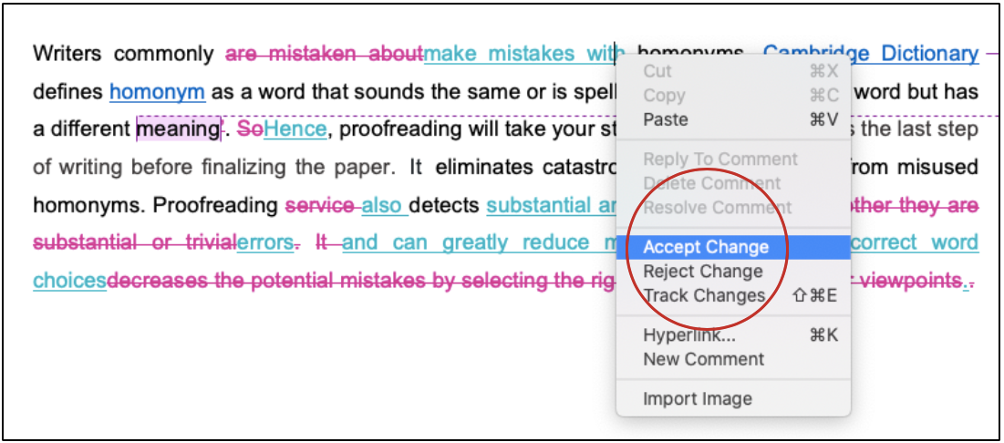
English formatting service
You can also avail of our assistance if you are looking for editors who can format your manuscript, or just check on the particular styles for the formatting task as per the guidelines provided to you, e.g., APA, MLA, or Chicago/Turabian styles. Best Edit & Proof editors and proofreaders provide all sorts of academic writing help, including editing and proofreading services, using our user-friendly website, and a streamlined ordering process.
Get a free quote for editing and proofreading now!
Visit our order page if you want our subject-area editors or language experts to work on your manuscript to improve its tone and style and give it a perfect academic tone and style through proper editing and proofreading. The process of submitting a paper is very easy and quick. Click here to find out how it works.
Our pricing is based on the type of service you avail of here, be it editing or proofreading. We charge on the basis of the word count of your manuscript that you submit for editing and proofreading and the turnaround time it takes to get it done. If you want to get an instant price quote for your project, copy and paste your document or enter your word count into our pricing calculator.

24/7 customer support | Live support
Contact us to get support with academic editing and proofreading. We have a 24/7 active live chat mode to offer you direct support along with qualified editors to refine and furbish your manuscript.

Stay tuned for updated information about editing and proofreading services!
Follow us on Twitter, LinkedIn, Facebook, Instagram, and Medium .
For more posts, click here.
- Editing & Proofreading
- Citation Styles
- Grammar Rules
- Academic Writing
- Proofreading
- Microsoft Tools
- Academic Publishing
- Dissertation & Thesis
- Researching
- Job & Research Application
Similar Posts
How to Determine Variability in a Dataset
How to Determine Central Tendency
How to Specify Study Variables in Research Papers?
Population vs Sample | Sampling Methods for a Dissertation
7 Issues to Avoid That may Dent the Quality of Thesis Writing
How to Ensure the Quality of Academic Writing in a Thesis and Dissertation?
How to Define Population and Sample in a Dissertation?
Recent Posts
ANOVA vs MANOVA: Which Method to Use in Dissertations?
They Also Read

In drafting a manuscript, thesis, or dissertation, the discussion section is usually one of the last to be written. Notwithstanding, it is arguably the most important section in a manuscript. Due to its relevance, it is usually the most challenging to write, as it requires top-level expertise. This article seeks to lay bare 5 helpful considerations to make when writing a sound discussion section.

Academic writing is a particular type of nonfiction writing, which is used in various academic works, such as reports of university research, proposals of new theories by the researchers, or papers released by scholars analyzing the culture of their fields. This article provides nine practical tips for academic writing that a writer must remember to improve his/her writing style.

Submitting a journal article can be a nerve-wracking experience. After all, this piece of work requires hours of research, analysis, and work poured into it. Therefore, you would wish for it to be acknowledged, selected, and published. This guide will give you some crucial answers, so go ahead and take a read. This way, you can ensure that your journal submission is devoid of any hassle.

As a college student in the USA, the UK, Canada, or anywhere else, you may have a wealth of opportunities for freelance work due to your connections. Freelancing can be an excellent way to create an income stream and expand your writing portfolio. Take early advantage of your education while you're still in school and start a freelancing career. This handout provides an easy guide for freelance opportunities for college students.

Blog writing is an effective way to share your knowledge and ideas with your target group. Here you can dive deep and talk about your favorite topics, showcase your expertise and attract an audience or readers interested in your work. However, creating a perfect blog post can sometimes get overwhelming – from choosing the right topics to selecting the proper format for your articles to picking images that generate interest and engagement, it's no less than a task.

A theoretical framework primarily supports the idea of a research study. It bears all the theories that prove the essence and importance of any research. In a nutshell, it is developed to explain the research and comprehend its circumstances. It may involve all the theory-based logic behind the importance and existence of your research in academics. This step-by-step guide discusses how to build a theoretical framework for a dissertation.

Research methodology is about the data collection and analysis methods employed in your research. Thus, this section addresses what you performed and how you did it, letting readers assess the reliability and validity of your study and is a critical part of your thesis or dissertation.
Have a language expert improve your writing
Run a free plagiarism check in 10 minutes, generate accurate citations for free.
- Knowledge Base
- Research paper
- Research Paper Format | APA, MLA, & Chicago Templates
Research Paper Format | APA, MLA, & Chicago Templates
Published on November 19, 2022 by Jack Caulfield . Revised on January 20, 2023.
The formatting of a research paper is different depending on which style guide you’re following. In addition to citations , APA, MLA, and Chicago provide format guidelines for things like font choices, page layout, format of headings and the format of the reference page.
Scribbr offers free Microsoft Word templates for the most common formats. Simply download and get started on your paper.
APA | MLA | Chicago author-date | Chicago notes & bibliography
- Generate an automatic table of contents
- Generate a list of tables and figures
- Ensure consistent paragraph formatting
- Insert page numbering
Instantly correct all language mistakes in your text
Upload your document to correct all your mistakes in minutes

Table of contents
Formatting an apa paper, formatting an mla paper, formatting a chicago paper, frequently asked questions about research paper formatting.
The main guidelines for formatting a paper in APA Style are as follows:
- Use a standard font like 12 pt Times New Roman or 11 pt Arial.
- Set 1 inch page margins.
- Apply double line spacing.
- If submitting for publication, insert a APA running head on every page.
- Indent every new paragraph ½ inch.
Watch the video below for a quick guide to setting up the format in Google Docs.
The image below shows how to format an APA Style title page for a student paper.
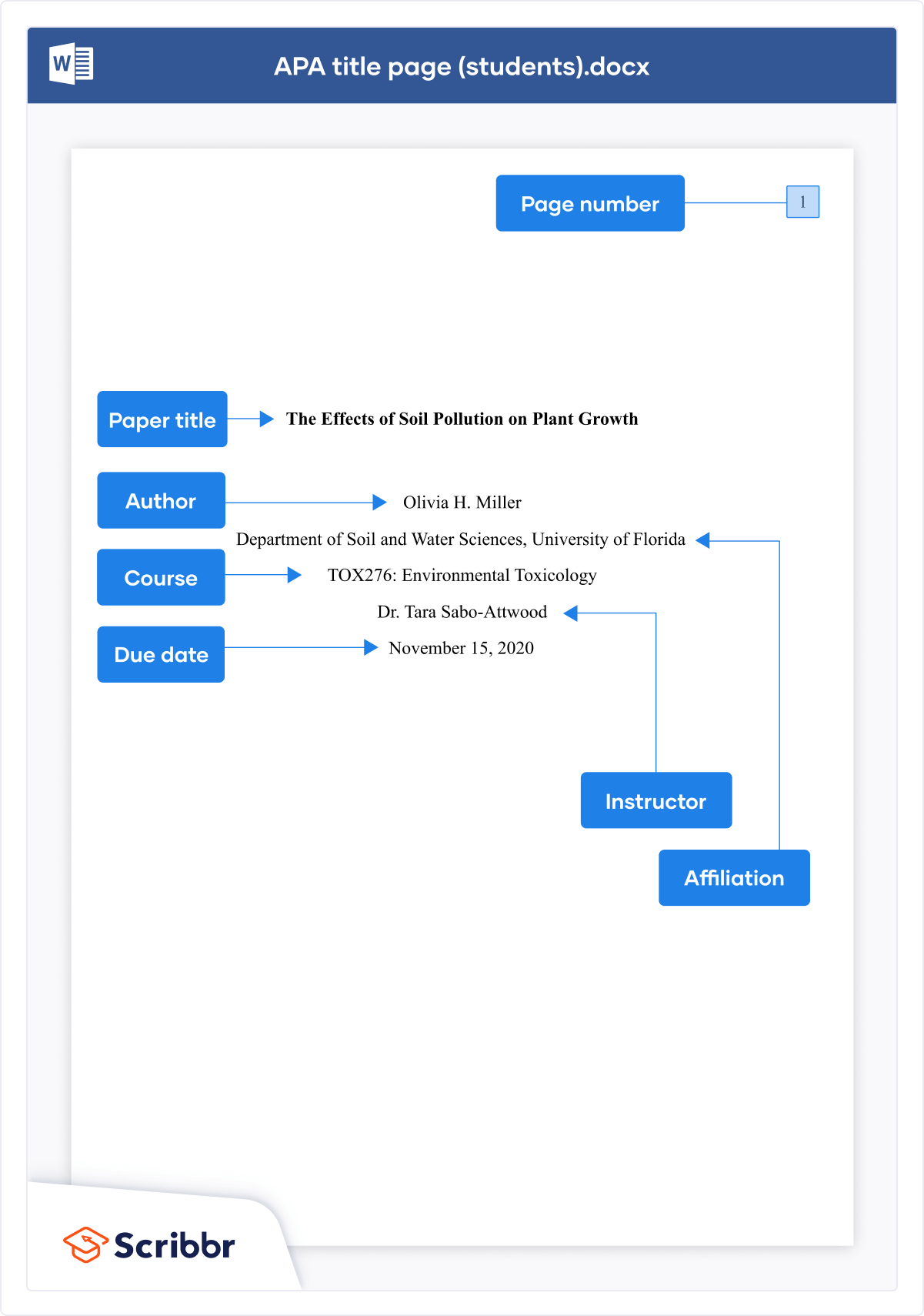
Running head
If you are submitting a paper for publication, APA requires you to include a running head on each page. The image below shows you how this should be formatted.
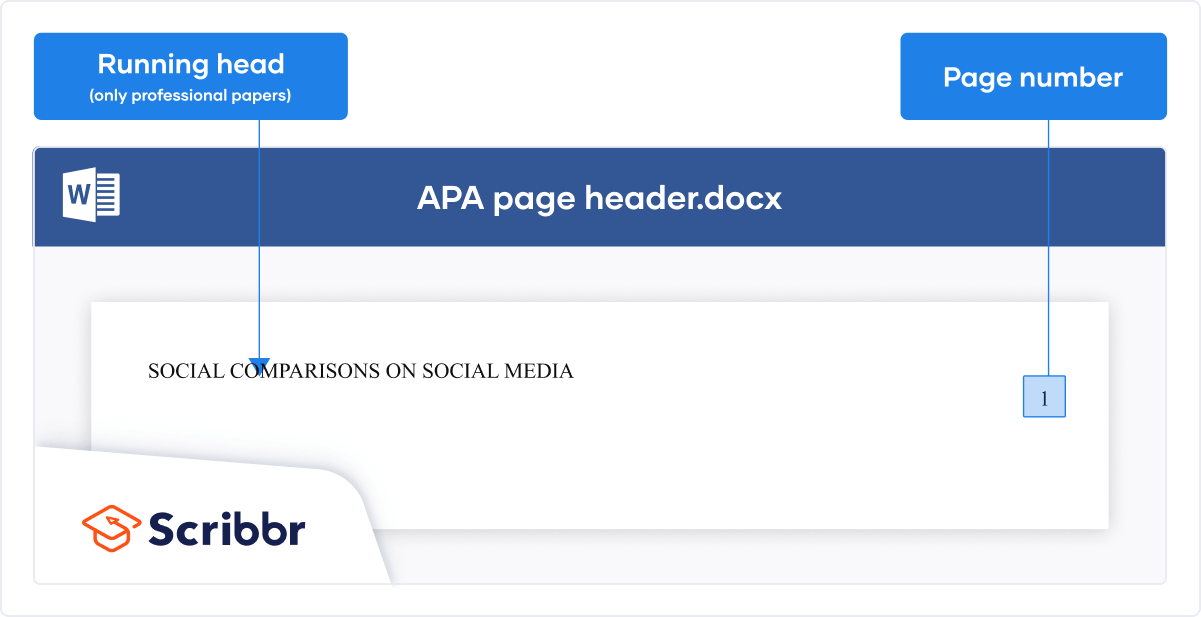
For student papers, no running head is required unless you have been instructed to include one.
APA provides guidelines for formatting up to five levels of heading within your paper. Level 1 headings are the most general, level 5 the most specific.
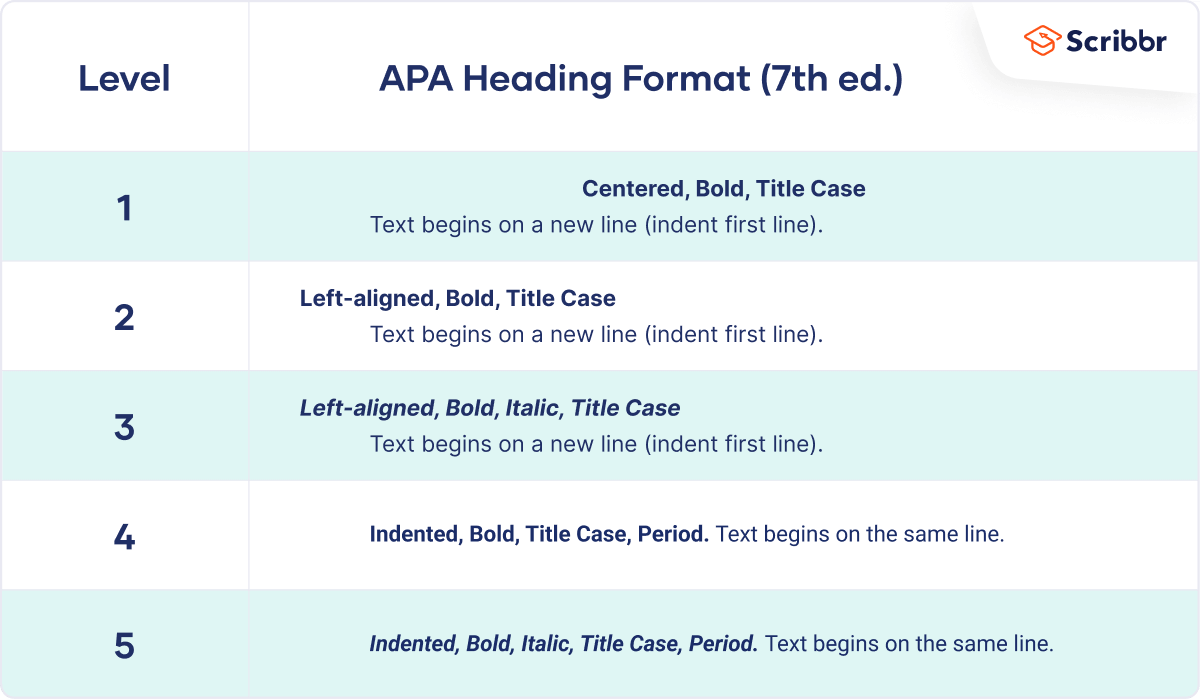
Reference page
APA Style citation requires (author-date) APA in-text citations throughout the text and an APA Style reference page at the end. The image below shows how the reference page should be formatted.
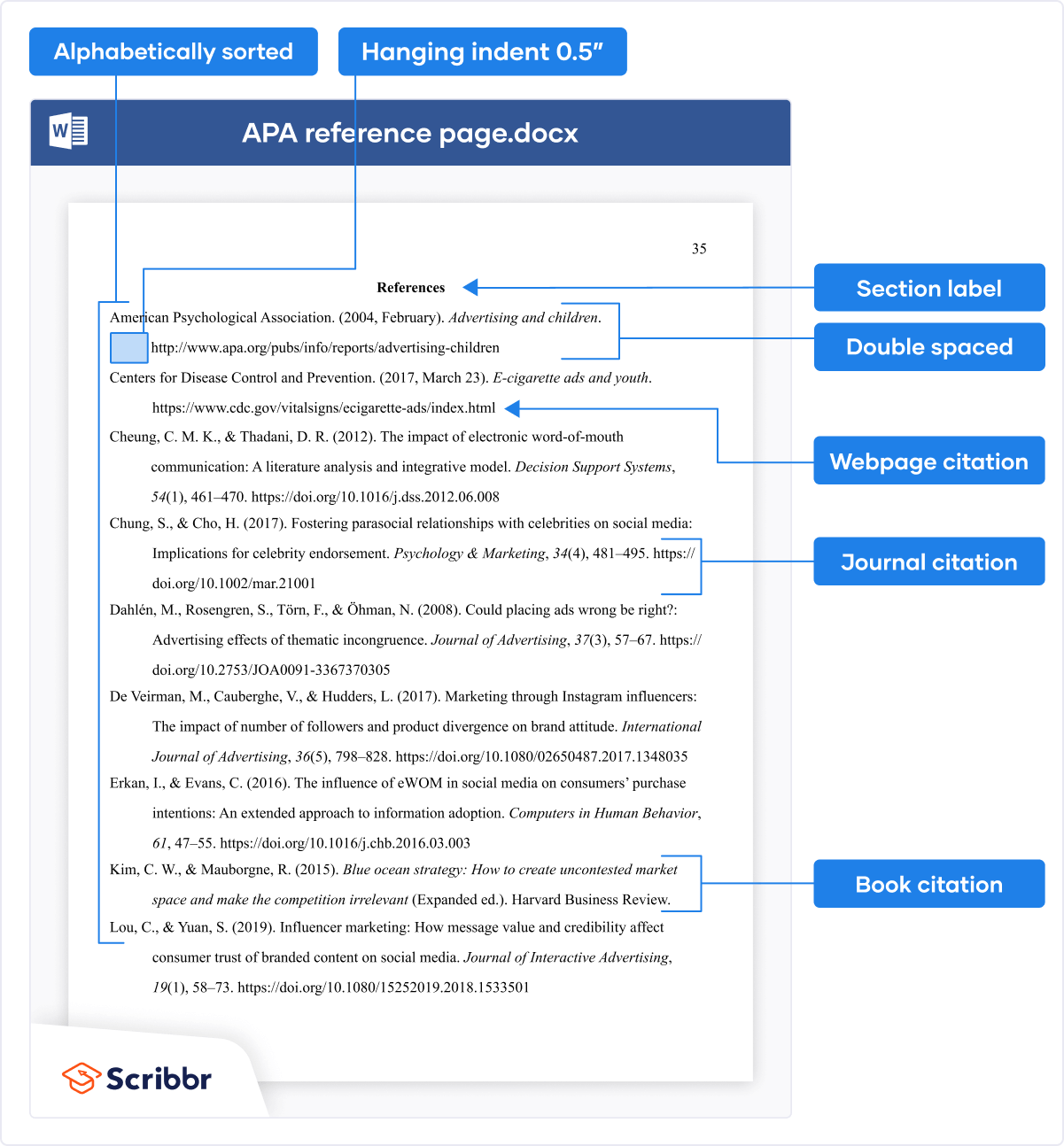
Note that the format of reference entries is different depending on the source type. You can easily create your citations and reference list using the free APA Citation Generator.
Generate APA citations for free
Don't submit your assignments before you do this
The academic proofreading tool has been trained on 1000s of academic texts. Making it the most accurate and reliable proofreading tool for students. Free citation check included.

Try for free
The main guidelines for writing an MLA style paper are as follows:
- Use an easily readable font like 12 pt Times New Roman.
- Use title case capitalization for headings .
Check out the video below to see how to set up the format in Google Docs.
On the first page of an MLA paper, a heading appears above your title, featuring some key information:
- Your full name
- Your instructor’s or supervisor’s name
- The course name or number
- The due date of the assignment
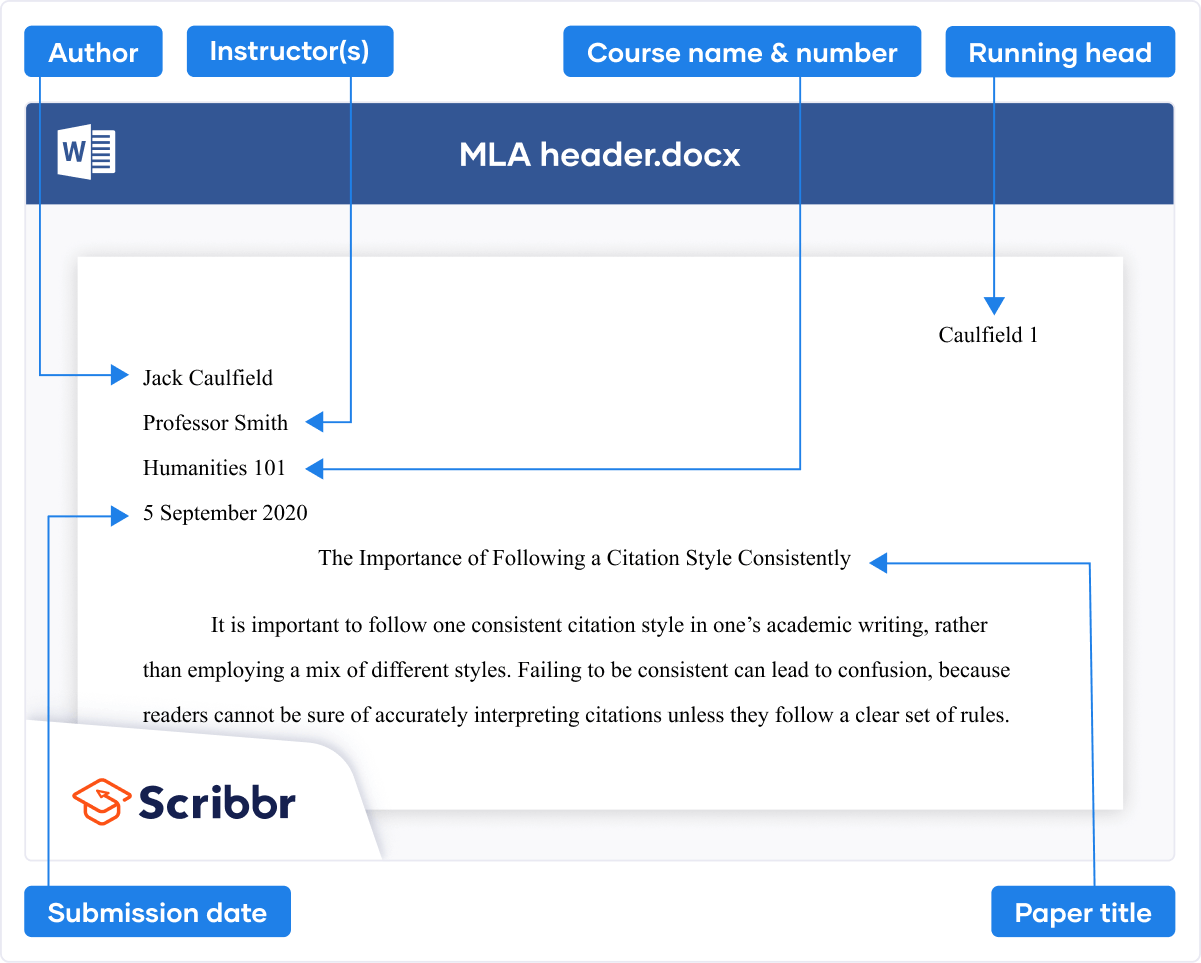
Page header
A header appears at the top of each page in your paper, including your surname and the page number.
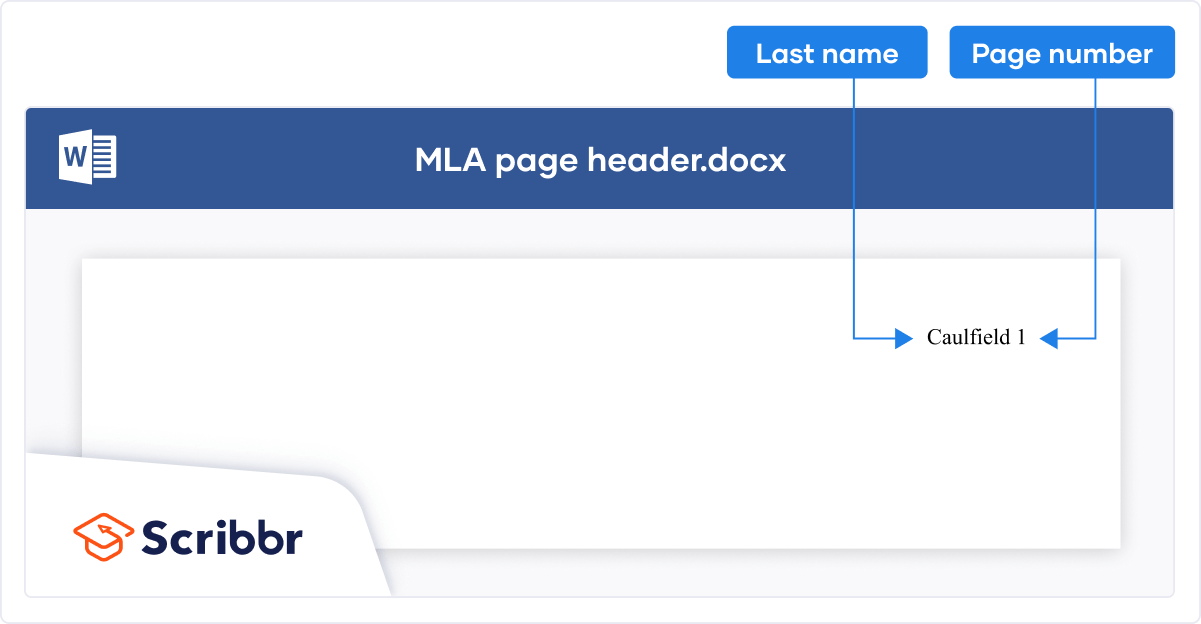
Works Cited page
MLA in-text citations appear wherever you refer to a source in your text. The MLA Works Cited page appears at the end of your text, listing all the sources used. It is formatted as shown below.
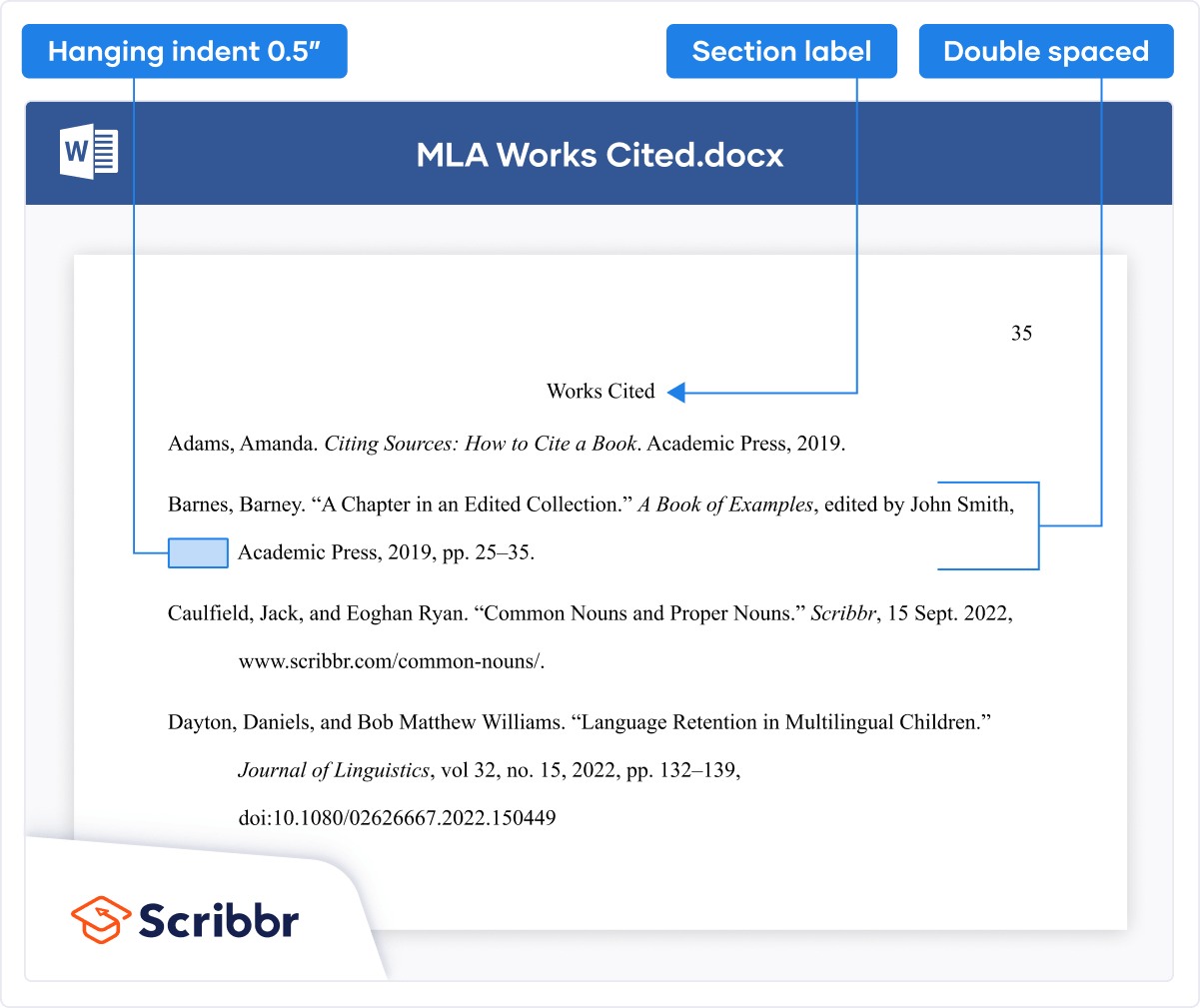
You can easily create your MLA citations and save your Works Cited list with the free MLA Citation Generator.
Generate MLA citations for free
The main guidelines for writing a paper in Chicago style (also known as Turabian style) are:
- Use a standard font like 12 pt Times New Roman.
- Use 1 inch margins or larger.
- Place page numbers in the top right or bottom center.
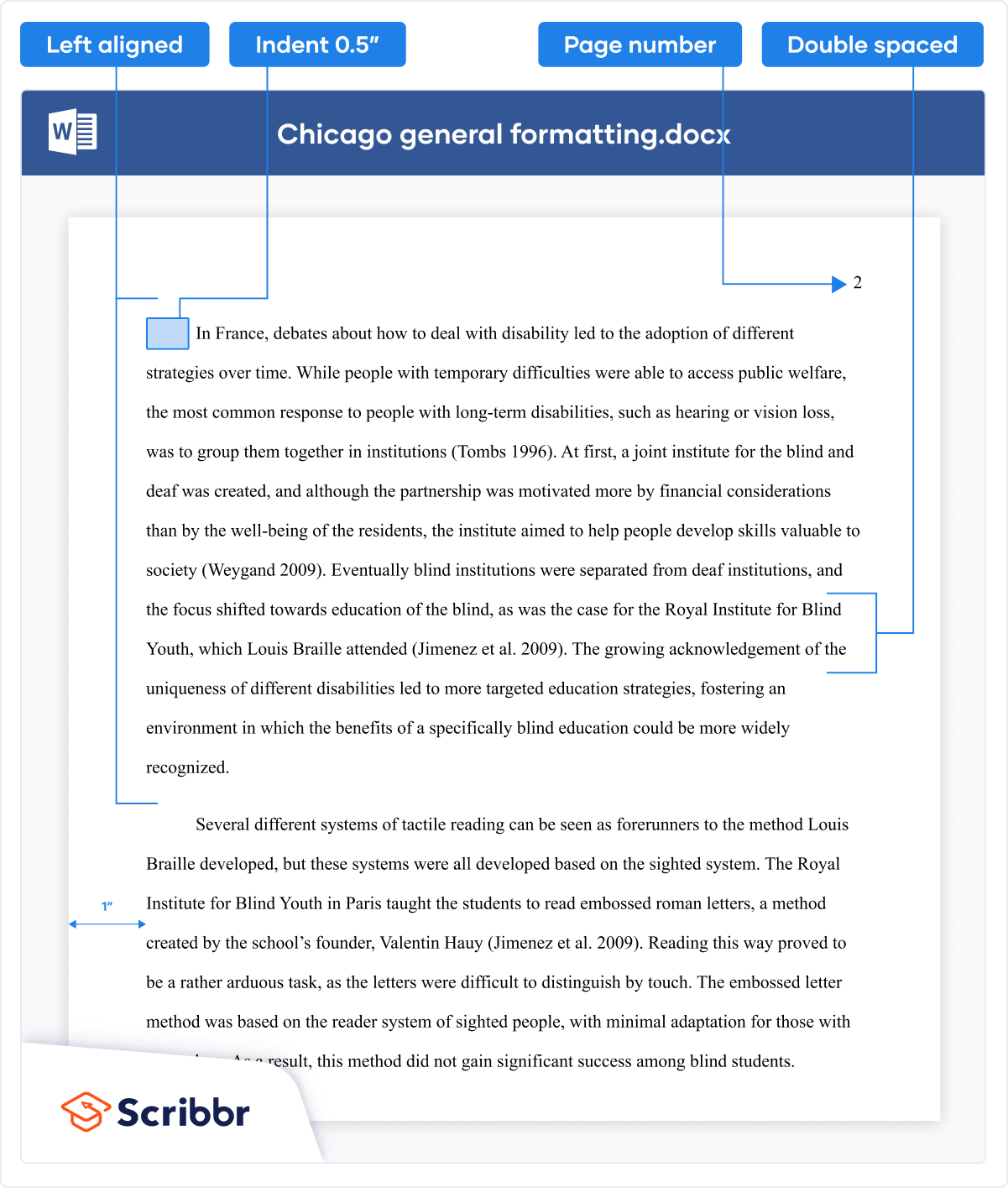
Chicago doesn’t require a title page , but if you want to include one, Turabian (based on Chicago) presents some guidelines. Lay out the title page as shown below.
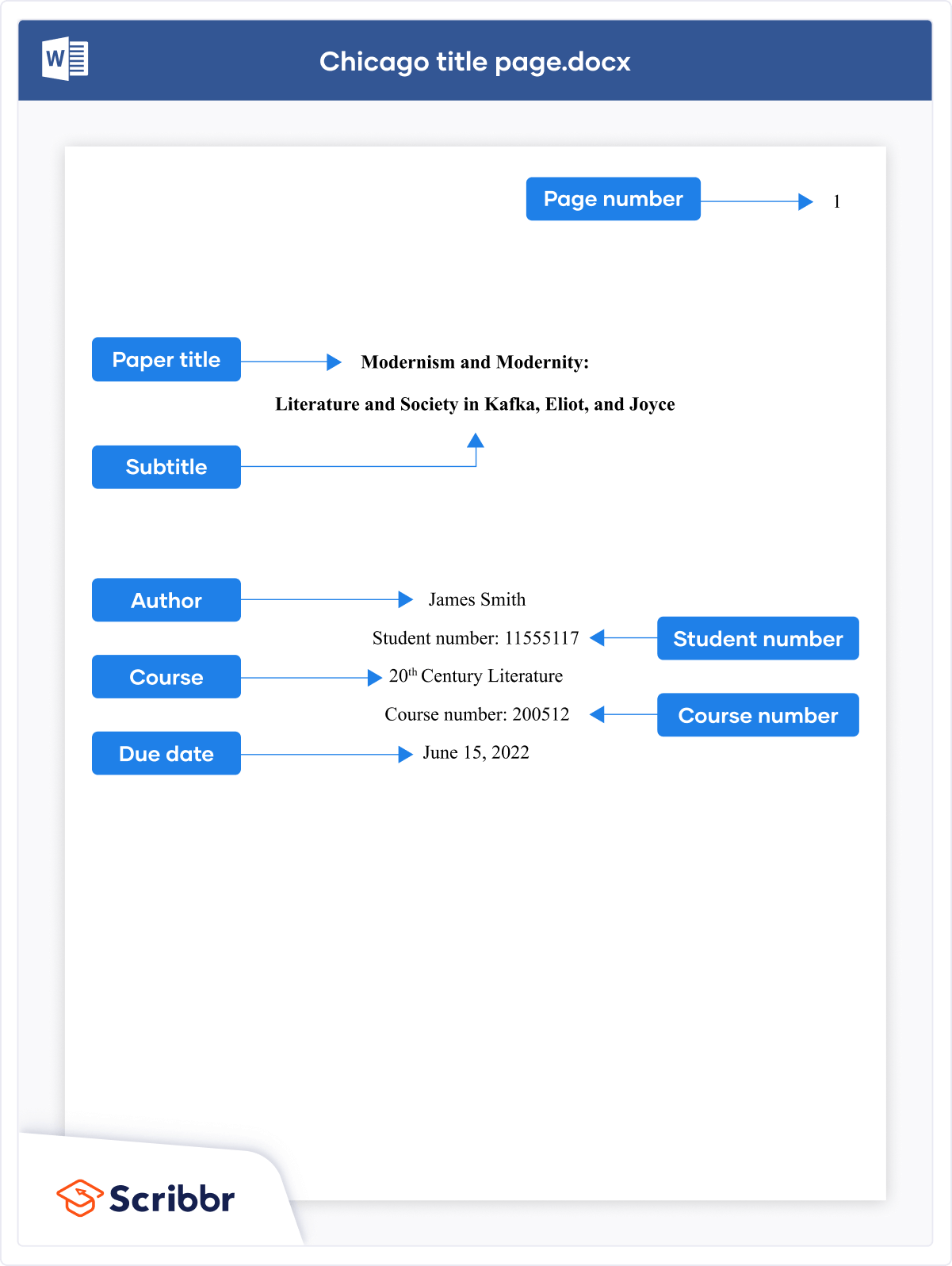
Bibliography or reference list
Chicago offers two citation styles : author-date citations plus a reference list, or footnote citations plus a bibliography. Choose one style or the other and use it consistently.
The reference list or bibliography appears at the end of the paper. Both styles present this page similarly in terms of formatting, as shown below.
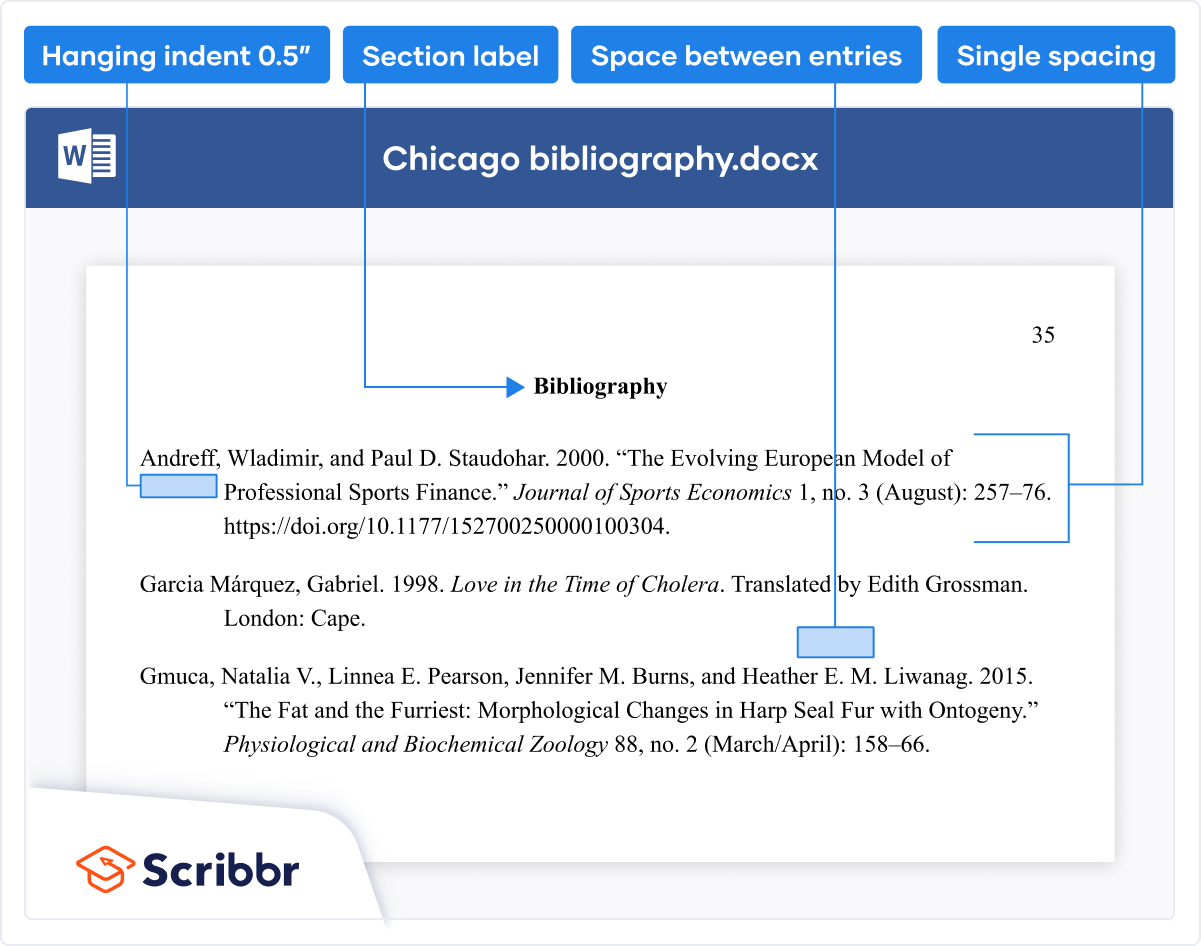
To format a paper in APA Style , follow these guidelines:
- Use a standard font like 12 pt Times New Roman or 11 pt Arial
- Set 1 inch page margins
- Apply double line spacing
- Include a title page
- If submitting for publication, insert a running head on every page
- Indent every new paragraph ½ inch
- Apply APA heading styles
- Cite your sources with APA in-text citations
- List all sources cited on a reference page at the end
The main guidelines for formatting a paper in MLA style are as follows:
- Use an easily readable font like 12 pt Times New Roman
- Include a four-line MLA heading on the first page
- Center the paper’s title
- Use title case capitalization for headings
- Cite your sources with MLA in-text citations
- List all sources cited on a Works Cited page at the end
The main guidelines for formatting a paper in Chicago style are to:
- Use a standard font like 12 pt Times New Roman
- Use 1 inch margins or larger
- Place page numbers in the top right or bottom center
- Cite your sources with author-date citations or Chicago footnotes
- Include a bibliography or reference list
To automatically generate accurate Chicago references, you can use Scribbr’s free Chicago reference generator .
Cite this Scribbr article
If you want to cite this source, you can copy and paste the citation or click the “Cite this Scribbr article” button to automatically add the citation to our free Citation Generator.
Caulfield, J. (2023, January 20). Research Paper Format | APA, MLA, & Chicago Templates. Scribbr. Retrieved August 23, 2024, from https://www.scribbr.com/research-paper/research-paper-format/
Is this article helpful?

Jack Caulfield
Other students also liked, apa format for academic papers and essays, mla format for academic papers and essays, chicago style format for papers | requirements & examples, get unlimited documents corrected.
✔ Free APA citation check included ✔ Unlimited document corrections ✔ Specialized in correcting academic texts
Difference between a research paper, dissertation & thesis
When it comes to writing academic papers, students should have the right skills if they must succeed. Whether it is doing a weekly essay assignment, crafting a term paper, or doing research, the best learners are those who have mastered the art of literary composition. You should also note that understanding how each school paper differs from the other puts you ahead of the pack. Most of the schools, universities and institutions require you to undertake research at some point or another in form of coursework .
Differences based on the definition
Definitive differences between academic papers simplify things for a college newbie yet to write his or her academic paper. Now, on defining the thesis, research and dissertation, the following are worth noting:
Length of paper and methodology
Differences based on knowledge inference and hypothesis.
A hypothesis is an educated guess. Before you conduct a study, assumptions have to be made that something will turn out in some way. Most importantly, how the outcome will impact a population informs the construction of a hypothesis/thesis statement. In research and dissertation writing, students must exhibit a rigorous understanding of a subject based on a study. It is on this premise that they must come up with/infer a meaningful conclusion. However, when writing thesis papers, the formulation of a hypothesis comes after researching and writing on a subject.
Differences based on the approach
Mode of publication and utilization, differences based on the level of academia.
While students can write research papers at any level, they are most common at the undergraduate level. Completion of a research paper often leads to the conferment of an undergraduate degree. And when it comes to writing dissertation papers, the bargain is qualifying for a master’s degree, thusly; postgraduate, Mphil or MBA. It means if you are not writing a dissertation to obtain a postgraduate degree, you do so as a means of enrolling in a postgraduate program. Thesis papers lead to the conferment of a Ph.D. degree or a doctorate as some scholars call it. Students who write thesis papers do so within the last two years of their academic life.
Final Thoughts
About the author, leave a comment cancel reply.
Your email address will not be published. Required fields are marked *

- Customer Reviews
- Extended Essays
- IB Internal Assessment
- Theory of Knowledge
- Literature Review
- Dissertations
- Essay Writing
- Research Writing
- Assignment Help
- Capstone Projects
- College Application
- Online Class
Literature Review vs Research Paper: What’s the Difference?
by Antony W
June 26, 2024

This is a complete student’s guide to understanding literature review vs research paper.
We’ll teach you what they’re, explain why they’re important, state the difference between the two, and link you to our comprehensive guide on how to write them.
Literature Review Writing Help
Writing a literature review for a thesis, a research paper, or as a standalone assignment takes time. Much of your time will go into research, not to mention you have other assignments to complete.
If you find writing in college or university overwhelming, get in touch with our literature review writers for hire at 25% discounts and enjoy the flexibility and convenience that comes with professional writing help. We’ll help you do everything, from research and outlining to custom writing and proofreading.
What is a Literature Review?
A literature review document is a secondary source of information that provides an overview of existing knowledge, which you can use to identify gaps or flaws in existing research. In literature review writing, students have to find and read existing publications such as journal articles, analyze the information, and then state their findings.
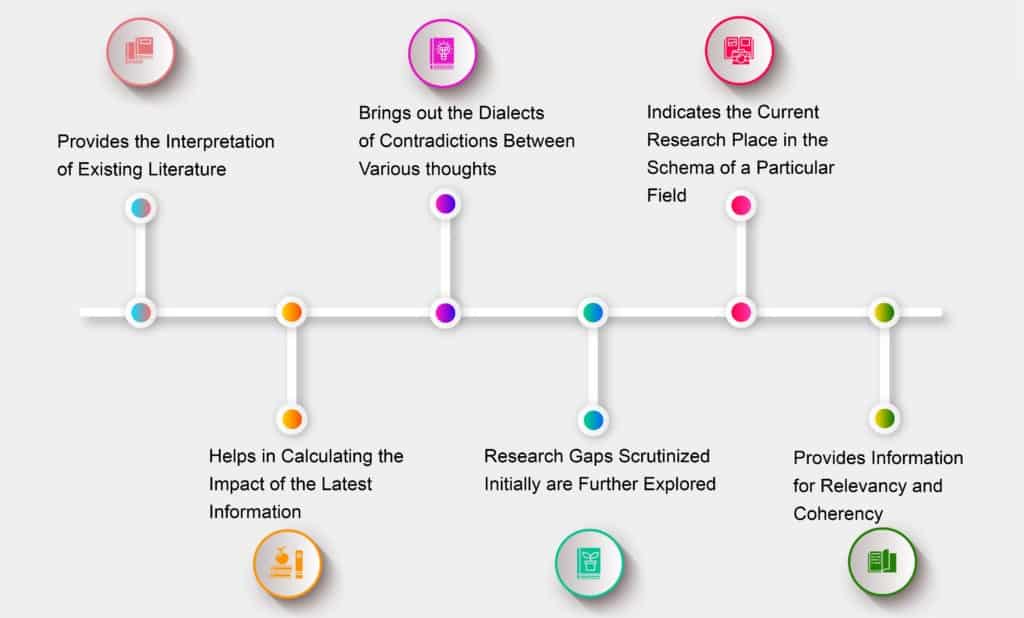
Credit: Pubrica
You’ll write a literature review to demonstrate your understanding on the topic, show gaps in existing research, and develop an effective methodology and a theoretical framework for your research project.
Your instructor may ask you to write a literature review as a standalone assignment. Even if that’s the case, the rules for writing a review paper don’t change.
In other words, you’ll still focus on evaluating the current research and find gaps around the topic.
Types of Literature Reviews
There are three types of review papers and they’re a follows:
1. Meta-analysis
In meta-analysis review paper, you combine and compare answers from already published studies on a given subject.
2. Narrative Review
A narrative review paper looks into existing information or research already conducted on a given topic.
3. Systematic Review
You need to do three things if asked to write a systematic review paper.
First, read and understand the question asked. Second, look into research already conducted on the topic. Third, search for the answer to the question from the established research you just read.
What’s a Research Paper?
A research paper is an assignment in which you present your own argument, evaluation, or interpretation of an issue based on independent research.
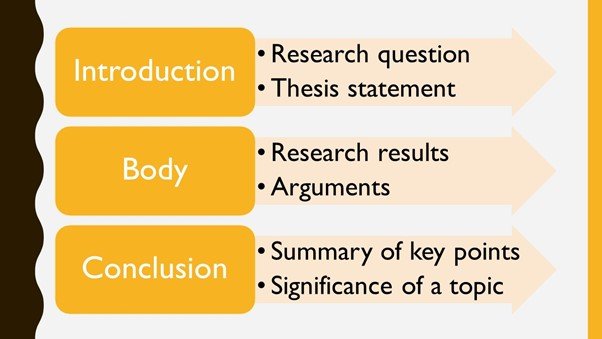
In a research paper project, you’ll draw some conclusions from what experts have already done, find gaps in their studies, and then draw your own conclusions.
While a research paper is like an academic essay, it tends to be longer and more detailed.
Since they require extended research and attention to details, research papers can take a lot of time to write.
If well researched, your research paper can demonstrate your knowledge about a topic, your ability to engage with multiple sources, and your willingness to contribute original thoughts to an ongoing debate.
Types of Research Papers
There are two types of research papers and they’re as follows:
1. Analytical Research Papers
Similar to analytical essay , and usually in the form of a question, an analytical research paper looks at an issue from a neutral point and gives a clear analysis of the issue.
Your goal is to make the reader understand both sides of the issue in question and leave it to them to decide what side of the analysis to accept.
Unlike an argumentative research paper, an analytical research paper doesn’t include counterarguments. And you can only draw your conclusion based on the information stretched out all through the analysis.
2. Argumentative Research Papers
In an argumentative research paper, you state the subject under study, look into both sides of an issue, pick a stance, and then use solid evidence and objective reasons to defend your position.
In argumentative writing, your goal isn’t to persuade your audience to take an action.
Rather, it’s to convince them that your position on the research question is more accurate than the opposing point of views.
Regardless of the type of research paper that you write, you’ll have to follow the standard outline for the assignment to be acceptable for review and marking.
Also, all research paper, regardless of the research question under investigation must include a literature review.
Literature Review vs Research Paper
The table below shows the differences between a literature review (review paper) and a research paper.
| . Read it to learn how you can structure your review paper. | . Read it to learn how to write your research project. | |
Frequently Asked Questions
1. is there a literature review in a research paper.
A research paper assignment must include a literature review immediately after the introduction chapter.
The chapter is significant because your research work would otherwise be incomplete without knowledge of existing literature.
2. How Many Literature Review Should Be in Research Paper?
Your research paper should have only one literature review. Make sure you write the review based on the instructions from your teacher.
Before you start, check the required length, number of sources to summarize, and the format to use. Doing so will help you score top grades for the assignment.
3. What is the Difference Between Research and Literature?
Whereas literature focuses on gathering, reading, and summarizing information on already established studies, original research involves coming up with new concepts, theories, and ideas that might fill existing gaps in the available literature.
4. How Long is a Literature Review?
How long a literature review should be will depend on several factors, including the level of education, the length of the assignment, the target audience, and the purpose of the review.
For example, a 150-page dissertation can have a literature review of 40 pages on average.
Make sure you talk to your instructor to determine the required length of the assignment.
5. How Does a Literature Review Look Like?
Your literature review shouldn’t be a focus on original research or new information. Rather, it should give a clear overview of the already existing work on the selected topic.
The information to review can come from various sources, including scholarly journal articles , government reports, credible websites, and academic-based books.
About the author
Antony W is a professional writer and coach at Help for Assessment. He spends countless hours every day researching and writing great content filled with expert advice on how to write engaging essays, research papers, and assignments.
Essay vs Research Paper: What Sets Them Apart?
Table of contents
- 1.1 What Is an Essay?
- 1.2 What Is a Research Paper?
- 2.1 Purpose and Objective
- 2.2 Structure and Organization
- 2.3 Length and Depth
- 2.4 Sources and Evidence
- 2.5 Voice and Style
- 2.6 Audience and Presentation
- 3 Essay vs Research Paper: 10 Points of Difference
- 4 What Is the Difference Between Research Paper and Different Types of Papers
- 5 Let’s Sum Up
Every student needs to write some academic papers for the university. However, even young people with experience can’t determine the difference between an essay and a research paper. Although these two areas of academic writing have many similarities, the requirements are still significantly different.
- We will outline the key differences between these two types of academic writing.
- In this article, you will get a clear definition of an essay and research paper.
- You will learn more about the organization, structure, essay, and research paper requirements.
Before we dive into the detailed definitions, let’s first explore the key differences between an essay and a research paper.
| Criteria | Research Paper | Essay |
|---|---|---|
| Focus | Explores and presents various viewpoints on a topic while also including the writer’s insights and ideas. | Primarily expresses the writer’s point of view. |
| Length | Typically spans at least 8 pages in length. | Typically short, with an average length of 5 paragraphs. |
| Depth of Understanding | Requires a deep understanding of the topic, gained through thorough research. | Does not always require an in-depth understanding of the topic. |
| Familiarity with Sources | Demands familiarity with research writings related to the chosen subject. | May or may not need familiarity with other research or writings. |
| Skill Development | Enhances the writer’s knowledge about the topic. | Develops the writer’s skills in presenting ideas clearly and effectively. |
| Approach | Examines and compares different sources of information on a topic, ultimately presenting an overview of the findings. | The writer practices organizing thoughts logically and coherently. |
| Types and Variations | Research papers come in various forms such as compare and contrast, argumentative, analytical, cause and effect, and subject-based papers, with the latter being the most common. A specific subject or topic is chosen, researched, and then written about in detail. | Essays come in different types such as academic, narrative, and philosophical. Academic essays often include a literature review that evaluates, describes, summarizes, and clarifies the selected material. |
| Process and Presentation | After gathering detailed information on the topic, the writer organizes and presents it from their perspective, using citations from the research to support their analysis. | In an essay, the writer conveys personal thoughts and ideas. The purpose and type of essay are considered, along with the intended audience. The writing must be well-structured, clear, and supported by relevant facts and examples. |
Definitions and Overview
What is an essay.
An essay is a short piece of writing that presents a personal opinion on a specific topic. Essays can be formal or informal, but in an academic setting, they are usually formal. The main purpose of an essay is to inform the reader or argue a particular perspective.
Essays do not always aim to be scientific but require a clear structure. This structure typically includes an introduction, a body, and a conclusion. Following this format lets you organize your thoughts and communicate them effectively.
With their versatility, essays can cover various topics, from complex ideas to everyday subjects. What makes your essay unique is the creativity and originality of your ideas. Before you begin, it is important to drafting an essay carefully. This process involves brainstorming fresh ideas and planning how to present them. Although your classmates might use the same basic structure, your writing skills and unique perspective will help your essay stand out. Focus on making your ideas compelling, rather than just sticking to the format.
What Is a Research Paper?
A research paper explores a specific scientific topic in detail. It provides analysis, interpretation, and argument based on careful study. Unlike essays, research papers focus less on personal opinions and more on thorough examination of the subject. They require you to use different sources and add new insights to the academic discussion.
In a research paper, it is not enough to just present facts or share personal views. You need to study the topic in depth, understand what others have said about it, and clearly outline your approach. This type of assignment involves more than just collecting information. You must also evaluate the information to build a strong argument.
Teachers expect you to show your ability to analyze information, choose reliable sources, and have a deep understanding of the topic. Research papers require you to go beyond basic knowledge and present your findings in a clear and organized way.
A typical research paper consists of several key elements that are crucial for presenting your argument and findings clearly:
- Introduction: The paper begins with an introduction that sets the stage and includes a thesis statement.
- Body: The body follows, providing detailed analysis and evidence to support the thesis, using information from reliable sources.
- Research Paper Outline: Creating an outline helps organize these sections, ensuring a logical flow of ideas throughout the paper.
- Conclusion: This part ends with a summary of the main points and a restatement of the thesis.
Whether writing a research paper or a term paper, maintaining this clear structure is essential for demonstrating a thorough understanding of your topic.
Key Differences Between Essay and Research Paper
The central difference is the goal of these academic assignments. The essay aims to express an individual point of view and find a creative, fresh approach to an existing topic. A good research paper seeks to introduce scientific novelty by examining existing data and conducting new experiments to analyze the information obtained.
Purpose and Objective
The first and main difference between an essay and a research paper is the purpose of writing . An essay as an academic task has the goal of developing students’ creative thinking. It also teaches us a structured presentation of thoughts regarding a certain topic. The student is required to have a non-standard approach, fresh thoughts, and reasoned conclusions on the given topic.
The purpose of the research work is to study a scientific topic in detail. This academic assignment is aimed at assessing the student’s analytical abilities and competence to determine cause-and-effect relationships, filter sources, and formulate logical conclusions. Such work requires theoretical knowledge, preliminary study of existing scientific works, and the ability to formulate goals and research methods.
Moreover, a student is supposed to show the capacity to draw comprehensive conclusions based on available data and information obtained during independent research. This task may seem complicated to students, so they opt for resorting to the help of PapersOwl writing service to save time.
Structure and Organization
To start with, the basic structure of any college essay involves a text consisting of five paragraphs, divided into three main factions: introduction, body part, and conclusion. When students lack time to compose a nicely structured academic essay, they can always pay to write a research paper and have their tasks done by a professional. The introduction presents the topic, sets the main direction for further text, and also works as a bait to motivate the reader to study further work. The introduction is followed by three body paragraphs. Each of the three body paragraphs presents a separate idea.
The last paragraph of any essay is a conclusion. In this paragraph, the college or university student must resume the arguments and ideas presented in the text, summarizing them into the main message of the essay. Often, the idea that you present in your conclusions will be most memorable to the reader.
Consequently, let’s overview the structure of a research paper. Compared to the structure of an essay, the organization of a research paper is much more ornate. This type of work requires a title page and abstract that go before the main body of text. On the title page, the student describes his topic of work, as well as gives contact details. An abstract is a short description of the main ideas and research methods of your work. The research work itself consists of an introduction, background, main part, and conclusions. Also, at the very end, they often add acknowledgments and a list of references, which must be formatted following the required international format.
Length and Depth
The length and depth of analysis between these two academic assignments also differ significantly. As for the essay, it is often a short prose piece whose length does not exceed 1000 words. You are faced with the task of fitting a large array of ideas into a small amount of text. The essay format itself rarely requires rigorous and thorough research of the topic, but you should work on creativity and the presence of a message in your essay. Most academic papers fall in the 300 to 600-word range.
On the other hand, a research paper is a scientific project that includes many theoretical aspects that require analysis and clarification. Thus, the volume is significantly bigger. Basic research paper lengths range from 4,000 to 6,000 words. In this case, you will no doubt have to conduct a comprehensive analysis of the selected sources, formulate a research vector, and spend time conducting your experiments, or ask PapersOwl to do a research paper for you . A research paper is a scientific project that includes many theoretical aspects that require analysis and clarification.
Sources and Evidence
The presence of theoretical sources and references is not a mandatory requirement for an essay. You can state your own thoughts on a given topic without resorting to the help of existing sources. Present your ideas on the topic, giving arguments that seem logical to you. If you do decide to base your paper on existing works, you must be sure to indicate where the information was taken from. And yet, the teacher needs to see your own thoughts rather than a dry listing of existing ideas.
Unlike an essay, a quality research paper must include primary and secondary sources, as well as a specific citation format. Surely, you are not the first person to study this scientific topic. In order not to repeat existing thoughts, you need to conduct a search to form a reliable basis for your study. If you skip this step, you risk basing your paper on misleading scientific findings.
Voice and Style
The very specificity of the essay as an academic paper is the subjective presentation of information. A large percentage of your essay should consist of your perspective and vision of the chosen topic. For this reason, essays often use a less formal and more subjective tone. However, you can still use a large amount of colloquial vocabulary, completely disregarding the norms of formal style. Students often have trouble figuring out the right style for their university assignments. In such cases, a reasonable solution is to seek help from a specialist. When you buy custom-written essays from PapersOwl, you’ll always get a perfectly balanced academic paper.
On the other hand, a research paper is a serious scientific work. The student must maintain a formal tone while complying with all structural requirements. Also, in investigative work, there is little room for subjectivity and a personal approach since an objective style is required. At the same time, do not oversaturate your research work with formalism and standard clichés.
Audience and Presentation
The essay format can be used both in the educational process and in an independent literary style. Therefore, the audience for such a written assignment can be wide and varied. When you’re writing an essay, make sure it’s understandable in academia and for a wide audience.
Research work, on the contrary, is aimed at a range of professionals in the chosen field. Written in scientific language, the goal of this work is to attract the attention of scientists and students of certain majors. Your scientific work should be rich in theory and related terms.
Essay vs Research Paper: 10 Points of Difference
As you may have noticed, research papers and essays have many differences, both global and specific. These two types of academic assignments differ in the purpose of writing, have different structures and formats, and are aimed at testing different skills. And yet, every day, students face difficulties in understanding the basic requirements, which leads to incorrect execution of the task. To summarize the main differences, let’s look at the table below.
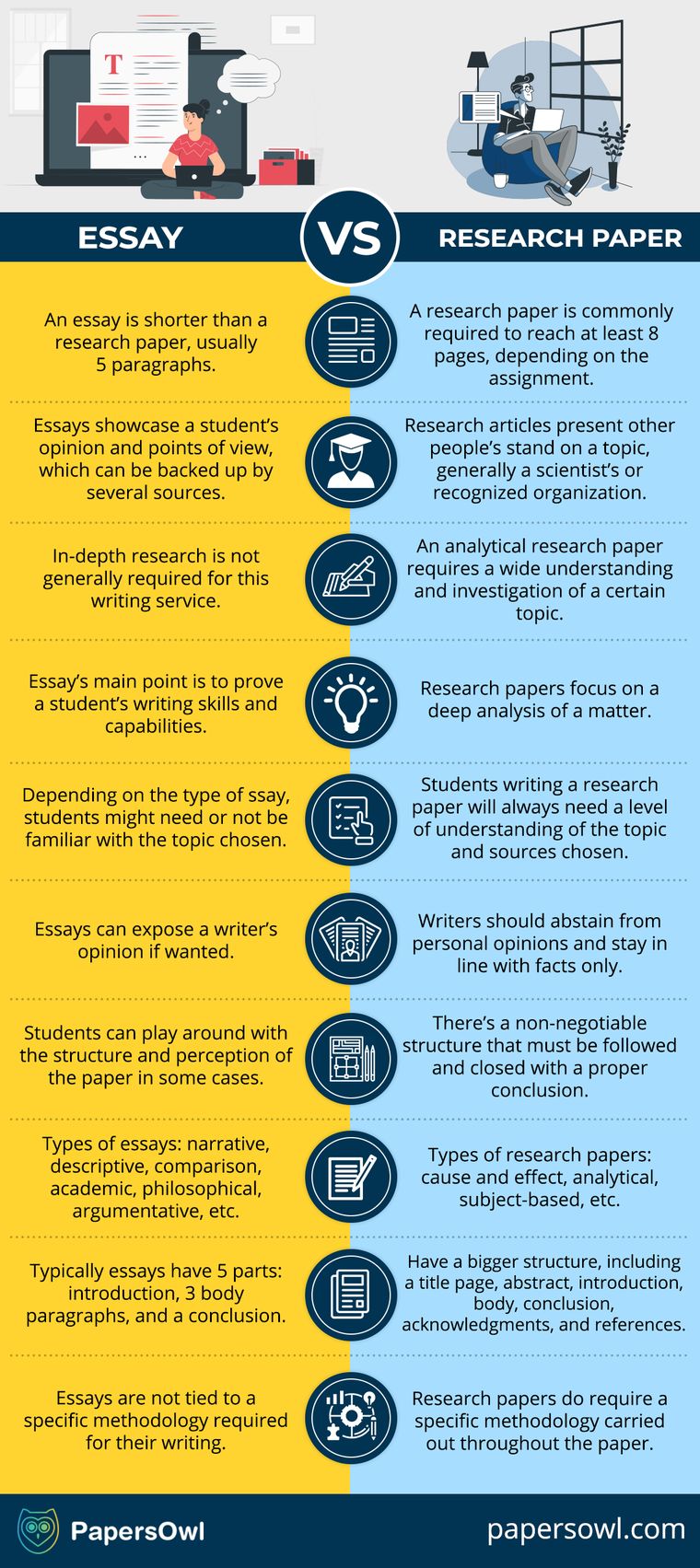
What Is the Difference Between Research Paper and Different Types of Papers
There are many types of papers, each focusing on different topics, serving different purposes, and requiring a specific structure. Those are different types of essays that share a common ground but differ in the way they present information and arguments.
Analytical paper. The purpose of such an essay is an in-depth analysis of the chosen topic, studying different approaches and points of view, and formulating one’s own conclusions based on the information studied and scientific evidence.
Argumentative paper. This type of essay takes as a basis an ambiguous topic; the author must take a certain position and provide a number of arguments.
Informative paper. It has an informative purpose — a presentation of information to the reader, preceded by careful analysis and selection of data.
Persuasive paper . The purpose of this paper is to present convincing arguments, using chosen writing techniques, confirming the author’s position regarding the selected scientific topic.
To get a high grade, you need to understand the requirements of academic requirements. No matter how informatively rich your work is, if it does not meet the requirements, it cannot be highly appreciated. Each type of academic assignment has its own clearly defined, unique format. It’s necessary to know the difference between a research paper vs argumentative essay so as not to get confused while completing a college assignment. So before you start writing an assignment, make sure you understand the type of academic writing required of you.
Let’s Sum Up
Research papers and essays are aimed at testing various skills of the student, following different structures, and having several requirements. An essay is a more creative writing task, which involves showing originality and expressing a personal opinion on a certain topic. At the same time, a research paper is a type of scientific writing that adheres to a strict structure and uses a formal tone. Understanding the main differences will make your writing process easier, saving you time researching the requirements. Remember that knowing the essence of the assignment is a key factor in writing a decent paper.
Readers also enjoyed

WHY WAIT? PLACE AN ORDER RIGHT NOW!
Just fill out the form, press the button, and have no worries!
We use cookies to give you the best experience possible. By continuing we’ll assume you board with our cookie policy.
- Key Differences
Know the Differences & Comparisons
Difference Between Thesis and Research Paper
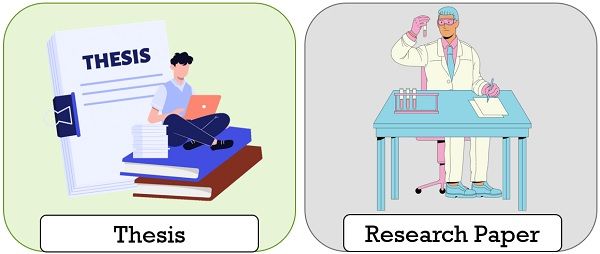
On the other hand, a research paper is analytical, argumentative and interpretative in nature. It involves the pursuit of knowledge and intelligent analysis of the information collected. It contains the idea of the author, often supported by expert opinions, research and information available in this regard.
Whether you are writing a thesis or research paper, they are equally challenging and take a lot of time to prepare. In this post, we will update you on all the points of difference between thesis and research paper.
Content: Thesis Vs Research Paper
- Key Elements
- Thesis Statement
How to start a research paper?
Comparison chart.
| Basis for Comparison | Thesis | Research Paper |
|---|---|---|
| Meaning | Thesis refers to an original, non-plagiarised, written scholastic paper acting as a final project prepared and submitted for obtaining a university degree. | Research Paper is an original, non-plagiarised, elongated form of an essay highlighting the interpretation, evaluation or argument submitted by a researcher. |
| What is it? | Final Project | Expanded essay on research findings |
| Length | Around 20,000 to 80,000 words. | Proportional to study |
| Contains | The central question that leads to the research. | Central argument |
| Objective | To obtain a degree or professional qualification or to showcase your knowledge in the concerned field of study. | To prove credibility and contribute knowledge in the concerned field. |
| Audience | Educational Committees or Professors | Scientist or Researcher |
| Guide | Written under supervision of the guide | Not written under the supervision of the guide. |
| Description of Subject Matter | Narrow | Broad |
| Usage | Not much used. | Used for further studies. |
What is Thesis?
The thesis is a document containing the research and findings that students submit to get the professional qualification or degree . It has to be argumentative, which proposes a debatable point with which people could either agree or disagree. In short, it is a research report in writing that contains a problem which is yet to be dealt with.
In a thesis, the researcher puts forth his/her conclusion. The researcher also gives evidence in support of the conclusion.
Submission of the thesis is a mandatory requirement of a postgraduate course and PhD degree. In this, the primary focus is on the novelty of research along with the research methodology.
It is all about possibilities, by introducing several anti-thesis. Also, it ends up all the possibilities by nullifying all these anti-thesis.
Key Elements of Thesis
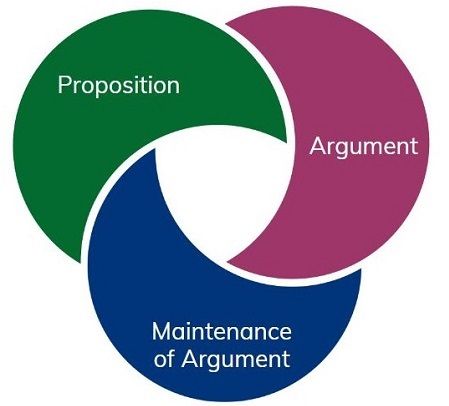
- Proposition : The thesis propagates an idea, hypothesis or recommendation.
- Argument : Gives reasons for accepting the proposition instead of just asserting a point of view.
- Maintenance of argument : The argument should be made cogent enough by providing suitable logic and adequate evidence.
Features of An Ideal Thesis
- An Ideal thesis is expected to add fresh knowledge to the existing theory.
- It communicates the central idea of the research in a clear and concise manner.
- An effective thesis is more than a simple statement, fact or question.
- It answers why and how questions concerned with the topic.
- To avoid confusion, it is worded carefully.
- It outlines the direction and scope of your essay.
- It gives reasons to the reader to continue reading.
Also Read : Difference Between Thesis and Dissertation
What is Thesis Statement?
A thesis statement is a sentence of one line, usually written at the end of your first paragraph. It presents the argument to the reader.
It is a blueprint of your thesis that directs the writer while writing the thesis and guides the reader through it.
What is Research Paper?
Research Paper is a form of academic writing. It is prepared on the basis of the original research conducted by the author on a specific topic, along with its analysis and interpretation of the findings.
An author generally starts writing a research paper on the basis of what he knows about the topic and seeks to find out what experts know. Further, it involves thorough and systematic research on a particular subject to extract the maximum information.
In short, a research paper is a written and published report containing the results of scientific research or a review of published scientific papers. Here, the scientific research is the primary research article, while the review of a published scientific paper is the review article.
In case of the primary research article, the author of the research paper provides important information about the research. This enables the scientific community members to:
- Evaluate it
- Reproduce the experiments
- Assess the reasoning and conclusions drawn
On the other hand, a review article is written to analyze, summarize and synthesize the research carried out previously.
When a research work is published in a scientific journal, it conveys the knowledge to a larger group of people and also makes people aware of the scientific work. Research work published as a research paper passes on knowledge and information to many people. The research paper provides relevant information about the disease and the treatment options at hand .
To start writing a research paper, one should always go for a topic that is interesting and a bit challenging too. Here, the key to choosing the topic is to pick the one that you can manage. So, you could avoid such topics which are very technical or specialized and also those topics for which data is not easily available. Also, do not go for any controversial topic.
The researcher’s approach and attitude towards the topic will decide the amount of effort and enthusiasm.
Steps for writing Research Paper

The total number of pages included in a Research Paper relies upon the research topic. It may include 8 to 10 pages, which are:
- Introduction
- Review of Literature
- Methodology
- Research Analysis
- Recommendations
Also Read : Difference Between Research Proposal and Research Report
Key Differences Between Thesis and Research Paper
- A thesis implies an original, plagiarism-free, written academic document that acts as a final project for a university degree of a higher level. But, Research Paper is a novel, plagiarism-free long essay. It portrays the interpretation, evaluation or argument submitted by a researcher.
- The thesis acts as a final project. Whereas a research paper is a kind of research manual of journals.
- The length of the thesis is around 20,000 to 80,000 words. On the contrary, the length of the research paper is relative to the study.
- The thesis focuses on the central question or statement of an intellectual argument that entails further research. On the contrary, the research paper is concerned with proving the central argument.
- The purpose of submitting the thesis is to get the degree or professional qualification. It also presents the knowledge of the candidate in the respective field. Conversely, the aim of publishing research papers is to prove credibility and contribute knowledge in the respective field.
- While the student submits the thesis to the educational committee or panel of professors who review it. In contrast, scientists and other researchers read and review the research paper.
- Preparation and completion of thesis is always under the guidance of a supervisor. For submission of the thesis, the university assigns a supervisor to each student, under whose guidance the thesis must be completed. As against, no supervisor is appointed as a guide in case of a research paper.
- The thesis contains a broader description of the subject matter. In contrast, the research paper contains a narrow description of the subject matter.
Once the research paper is published, it increases the fellowship and job opportunities for new researchers. On the other hand, thesis writing will enable the students to get the desired degree at the end of the course they have opted.
You Might Also Like:

Dr. Owenga says
February 23, 2023 at 2:38 pm
So good and informative. These are quite beneficial insights. Thanks
Leave a Reply Cancel reply
Your email address will not be published. Required fields are marked *
Save my name, email, and website in this browser for the next time I comment.
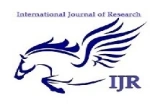
International Journal of Research (IJR)
IJR Journal is Multidisciplinary, high impact and indexed journal for research publication. IJR is a monthly journal for research publication.
DIFFERENCE BETWEEN RESEARCH PAPER AND JOURNAL ARTICLE
Difference between research paper and journal article.

Research Paper

Argumentative Research Paper
Analytical research paper, journal article, the differences, research paper:, journal article:.
- Share on Tumblr

- Already have a WordPress.com account? Log in now.
- Subscribe Subscribed
- Copy shortlink
- Report this content
- View post in Reader
- Manage subscriptions
- Collapse this bar
- Software Testing Course
- Software Engineering Tutorial
- Software Development Life Cycle
- Waterfall Model
- Software Requirements
- Software Measurement and Metrics
- Software Design Process
- System configuration management
- Software Maintenance
- Software Development Tutorial
- Software Testing Tutorial
- Product Management Tutorial
- Project Management Tutorial
- Agile Methodology
- Selenium Basics
Difference between Project Report and Research Report
1. Project Report : Project Report, as name suggest, is simply report that provide useful and important information for better business or company decision and also helps in control of project.
2. Research Report : Research Report, as name suggests, is simply report that provide useful result of formal investigation and outline processes, data, and findings and is usually prepared by analyst or strategist.
Difference between Project Report and Research Report :
| Project Report | Research Report |
|---|---|
| It mainly focuses on providing desired result of project. | It mainly focuses on providing information collected by analysis of data and issues. |
| It does not have a specific format. | It does have a specific format. |
| Factors affecting project report include time complexity, improper communication, cost related issues, unable to track risks, etc. | Factors affecting research report includes research style, improper managing, improper investigation, risk related issues, etc. |
| Its benefits include identifying risks, improve communication, track current progress of project, track budget, etc. | Its benefits include identification of knowledge gaps, knowledge transfer, use of objective data to make decisions, etc. |
| Its main objective is to state objective of business or company and various methods through which business or company can achieve success. | Its main objectives is to highlight findings, recommendations and essential details which can be helpful for research process. |
| It includes information regarding economic, technical, financial. managerial, and product aspects. | It includes problem investigated, type of subjects and data collection method involved, analytical procedure used, etc. |
| It is less difficult to understand and handle than research report. | It is more difficult to understand and handle than project report. |
| Type of project report includes risk report, baseline reports, time tracking report, resource report, variance report, etc. | Type of research report includes qualitative and quantitative research report, technical research report, popular research report, etc. |
| It is submitted to bankers or head of departments. | It is generally submitted to committees and heads of various departments or organizations. |

Please Login to comment...
Similar reads.
- Difference Between
- Software Engineering
- Technical Scripter 2020
Improve your Coding Skills with Practice
What kind of Experience do you want to share?

So what difference does it make? Mapping the outcomes of citizen engagement
Ids item types, copyright holder, external publisher.
- https://www.ntd.co.uk/idsbookshop/details.asp?id=1197
Usage metrics


IMAGES
COMMENTS
When writing a paper, maybe the only thing more daunting than actually writing it is deciding what you're even supposed to be writing about. Research reports, research papers...it gets confusing. They are actually not the same thing, and knowing the difference between them will save you time and frustration, help ...
This is a wonderful website with step-by-step information on how to write a research paper. My college English students found it very helpful, and they are actually using it! by Lori Fox on Nov 22, 2017. This site is amazing, it helped to receive a 98 on a research paper would recommend it if you are anywhere confused about writing a research ...
Research paper is a type of research report. A research paper is a document that presents the results of a research study or investigation. Research papers can be written in a variety of fields, including science, social science, humanities, and business. ... Dissertation vs Thesis - Key Differences.
Besides the definition of both, the main difference between a research paper and research report can be easily recognized only by having an overview of its complete format. Research paper encloses more chapters than the research report as a complete document. A fine research paper starts with a general introduction of the topic, and then ...
A research report is a collection of contextual data, gathered through organized research, that provides new insights into a particular challenge (which, for this article, is business-related). Research reports are a time-tested method for distilling large amounts of data into a narrow band of focus. Their effectiveness often hinges on whether ...
Experimental research paper. This type of research paper basically describes a particular experiment in detail. It is common in fields like: biology. chemistry. physics. Experiments are aimed to explain a certain outcome or phenomenon with certain actions. You need to describe your experiment with supporting data and then analyze it sufficiently.
Your task is to write up how you actually performed the experiment and evaluate the outcome. In contrast, a research paper requires you to independently develop an original argument. It involves more in-depth research and interpretation of sources and data. A lab report is usually shorter than a research paper.
INFOGRAPHIC :5 Differences between a research paper and a review paper. There are different types of scholarly literature. Some of these require researchers to conduct an original study, whereas others can be based on previously published research. Understanding each of these types and also how they differ from one another can be rather ...
An analytical research paper states the topic that the writer will be exploring, usually in the form of a question, initially taking a neutral stance. The body of the paper will present multifaceted information and, ultimately, the writer will state their conclusion, based on the information that has unfolded throughout the course of the essay. ...
Original Research: This is the most common type of journal manuscript used to publish full reports of data from research. It may be called an Original Article, Research Article, Research, or just Article, depending on the journal. The Original Research format is suitable for many different fields and different types of studies.
An outline of the research questions and hypotheses; the assumptions or propositions that your research will test. Literature Review. Not all research reports have a separate literature review section. In shorter research reports, the review is usually part of the Introduction. A literature review is a critical survey of recent relevant ...
What is a research paper? A research paper is a type of academic writing that provides an in-depth analysis, evaluation, or interpretation of a single topic, based on empirical evidence. Research papers are similar to analytical essays, except that research papers emphasize the use of statistical data and preexisting research, along with a strict code for citations.
However, there are some differences between the two. A research article is typically a shorter document that is published in a peer-reviewed journal. It focuses on a specific research question and provides a concise summary of the study's methodology, results, and conclusions. On the other hand, a research paper is usually a longer document ...
Step 1: Introduce your topic. Step 2: Describe the background. Step 3: Establish your research problem. Step 4: Specify your objective (s) Step 5: Map out your paper. Research paper introduction examples. Frequently asked questions about the research paper introduction.
The literature review is one part of a research paper. In a research paper, you use the literature review as a foundation and as support for the new insight that you contribute. The focus of a literature review, however, is to summarize and analyze the arguments and ideas of others without adding new contributions.
A research proposal is prepared at the beginning of the project. In contrast, the research report is prepared after the completion of the project. The length of a research proposal is about 4-10 pages. On the contrary, the length of the research report is about 100 to 300 pages.
White paper. A white paper is a report, often compiled by government agencies, businesses and nonprofit organizations, that outlines an issue and often explores possible solutions to a problem. For example, in November 2021, the federal Office of Community Oriented Policing Services released a white paper looking at factors that help or hinder ...
Here are four key differences between research papers and review papers: Purpose: Review papers evaluate existing research, identify trends, and discuss the current state of knowledge on a specific topic; they are based on the study of previously published literature. On the other hand, research paperscontain original research work undertaken ...
To the untrained eye, a research paper and a thesis might seem similar. However, there are some differences, concrete and subtle, that set the two apart. 1. Writing objectives. The objective behind writing a thesis is to obtain a master's degree or doctorate and the ilk.
The main guidelines for formatting a paper in APA Style are as follows: Use a standard font like 12 pt Times New Roman or 11 pt Arial. Set 1 inch page margins. Apply double line spacing. If submitting for publication, insert a APA running head on every page. Indent every new paragraph ½ inch.
A good research paper opens the gates to advanced academic writing which will involve the implementation of findings. A dissertation is a paper that students write as a requirement for the conferment of a diploma or degree. In some countries, Ph.D. students also write dissertations. A thesis is a paper students craft as a requirement for a ...
The information you use to write a research paper comes from different sources and is often considered raw. Function. The purpose of a literature review is to help readers find what's already published on the subject in. The purpose of a research paper is to present your own unique research on a subject. Writing.
The first and main difference between an essay and a research paper is the purpose of writing. An essay as an academic task has the goal of developing students' creative thinking. It also teaches us a structured presentation of thoughts regarding a certain topic.
The document discusses some key differences between research papers and reports. It notes that while both involve extensive research and analysis, research papers typically explore a topic in-depth and contribute new arguments or findings, while reports more often summarize existing information on a subject in a concise way. It also provides guidance on how to navigate these differences ...
While both thesis and research papers are academic writings, there is a difference between the two. A thesis refers to a scholarly research report that a scholar writes and submits for fulfilling academic requirements and obtaining a higher degree. It opens up various lines of enquiry into a range of possibilities like an antithesis.
The key difference is the use of each. One is for practice in writing, and the other is a certain practice for fellow practitioners. That said, one (research paper) is used more as a way to educate a student on how to write clearly and effectively about a topic, while the other (journal article) is written to educate the reader on a subject or ...
1. Project Report : Project Report, as name suggest, is simply report that provide useful and important information for better business or company decision and also helps in control of project. 2. Research Report : Research Report, as name suggests, is simply report that provide useful result of formal investigation and outline processes, data ...
In this paper, we report on a meta-case study analysis of a ten-year research programme on citizenship, participation and accountability which analysed a nonrandomised sample of 100 research studies of four types of citizen engagement in 20 countries.